#which define the entire ENDING of the saga which define the MEANING of the saga
Text
it really does matter so much that fringilla vigo is nilfgaardian, beauclairoise, for many reasons, but let's start here:
her entire role is that of an illusionist; one which she would not be were it not for her family lineage, rooted in beauclair:
There was a corridor in Beauclair Palace, and at the end a chamber, the existence of which no one knew about. (...) The corridor and the chamber, disguised by a powerful illusion, were known only to the palace’s original elven builders. And later–when the elves had gone, and Toussaint became a duchy–to the small number of sorcerers linked to the ducal house. Including Artorius Vigo, a master of magical arcana and great specialist in illusions. And his young niece, Fringilla, who had a special talent for illusions.
and since her talent in illusions is well-defined in the series, as it is her who grants geralt the very silver-mounted chrysoprase amulet which saves his life in the final fight against vilgefortz:
Geralt clenched Fringilla’s medallion in his fist.
The bar fell with a clang, striking the floor a foot from the Witcher’s head. Geralt rolled away and quickly got up on one knee. Vilgefortz leaped forward and struck. The bar missed the target again by a few inches. The sorcerer shook his head in disbelief and hesitated for a second. (...)
‘I didn’t know …’ Yennefer said at last, scrambling out of a pile of rubble. She looked terrible. The blood trickling from her nose had poured all over her chin and cleavage. ‘I didn’t know you could cast illusory spells,’ she repeated, seeing Geralt’s uncomprehending gaze, ‘capable even of deceiving Vilgefortz.’
‘It’s my medallion.’
‘Aha.’ She looked suspicious. ‘A curious thing...’
that talent is something which cannot, by far, be separated from her character. and returning back to her lineage, it is again her familial relations which place her in beauclair.
she was positioned there, ready to intercept geralt, as early as the autumnal equinox in september, by which time geralt had barely just left the town of riedbrune:
The world over, the autumn Equinox was a night of spectres, nightmares and apparitions, a night of sudden, suffocating awakenings, fraught with menace, among sweat-soaked and rumpled sheets. Neither did the most illustrious escape the apparitions and awakenings; (...) In the huge castle of Montecalvo the sorceress Philippa Eilhart leaped from damask sheets, without waking the Comte de Noailles’ wife. The dwarf Yarpen Zigrin in Mahakam, the old witcher Vesemir in the mountain stronghold of Kaer Morhen, the bank clerk Fabio Sachs in the city of Gors Velen and Yarl Crach an Craite on board the longboat Ringhorn all awoke more or less abruptly. The sorceress Fringilla Vigo came awake in Beauclair Castle*, as did the priestess Sigrdrifa of the temple of the goddess Freyja on the island of Hindarsfjall.
* Slight correction - As explained in Chapter 3 of Lady of the Lake, Beauclair is not a castle, but a palace.
and she's only invited to beauclair in such a capacity because she is a relative of the duchess:
‘I’m in Beauclair because the largest, best-stocked library in the known world is here. Apart from university libraries, naturally. But universities are jealous of giving access to their shelves, and here I’m a relation and good friend of Anarietta and can do as I wish.’
(whom, you may note, she stands by and jointly receives geralt with at their first meeting, and participates in the festival of the vat with)
and therefore, she was in a perfectly strategic position to delay geralt, keep him captive:
‘(...) Please at least tell us … has the Witcher calmed down now? Are you capable of keeping him in Toussaint at least until May?’
(…) ‘No,’ she answered at last. ‘Probably not until May. But I’ll do everything in my power to keep him here as long as possible.’
because fringilla is not just an illusionist literally, as in the magic she is naturally gifted at, but 'illusionist' is her entire identity as a character.
and as her family hails from beauclair, this specific identity is compounded with the fact that beauclair itself is the center of illusions, a dreamland, a fairytale:
‘There’s something bewitched about this place, this fucking Toussaint. Some kind of charm hangs over the whole valley. Especially over the palace (...) no two ways about it, there’s something bewitched about this bloody Toussaint.’
fringilla is an illusionist because she is beauclairoise. she not only hails from a long line of illusionists, but hails from, is related to the ruler of, the very city of illusions and dreams.
she is the illusionist not just in a literal sense, but in the entire narrative role of casting an illusion over our hero, because it is the illusion of love which keeps her and geralt in beauclair. (the tricky trick is that geralt, taking a page out of yennefer's playbook of seduction, cleverness, patience, was able to cast an illusion upon the mistress of illusions herself, free himself from the witch's spell, awake from a pleasant dream to face the harsh reality).
(sighs) and even if you want to forget fringilla's beauclairoise identity and erase her entire positioning as the illusionist which poses a threat to our heroes, entices them to complacency, her role as nilfgaardian in the sense of her academic identity and imperial service also defines her.
because it is also fringilla, the illusionist who casts the wool over people's eyes... who blinded yennefer at sodden hill.
‘We’ve already met,’ Yennefer spoke again.
‘I don’t recall,’ Fringilla said without looking away.
‘I’m not surprised. But I have a good memory for faces and figures. I saw you from Sodden Hill.’
‘In which case there can be no mistake,’ Fringilla Vigo said and raised her head proudly, sweeping her eyes over all those present. ‘I was at the Battle of Sodden.’
(...) ‘Occasionally one happens to see another person for only a split second, right before going blind, and one takes a dislike to them instantly.’
‘Oh, enmity is considerably more complicated,’ Fringilla said, squinting. ‘Imagine someone you don’t know at all standing at the top of a hill, and ripping a friend of yours to shreds in front of your eyes. You neither saw them nor know them at all, but you still don’t like them.’
‘So it goes,’ Yennefer said, shrugging. (...)
fringilla's (proud!) participation at the battle of sodden is a crux of the lodge, because she alongside her good friend, the scholarly assire, they are nilfgaardians who, owing to their nationality, find challenges meshing with the northern sorcereresses. the lodge brought together representatives of magic across nationalities in the midst of a raging, bloody war between them all.
and it's so integral to fringilla's character that she has imperial biases, that she approaches even the international lodge with an imperialist view.
with no factual basis, she initially exotifies and sexualizes the northern sorceresses, despite her own prior denial of these base stereotypes:
Fringilla Vigo was putting on a brave face, but she was anxious and stressed. She herself had often reprimanded young Nilfgaardian mages for uncritically yielding to stereotypical opinions and notions. She herself had regularly ridiculed the crude image painted by gossip and propaganda of the typical sorceress from the North: artificially beautiful, arrogant, vain and spoiled to the limits of perversion, and often beyond them. (...) Her untrammelled imagination offered up images of impossibly gorgeous women with diamond necklaces resting on naked breasts with rouged nipples, women with moist lips and eyes glistening from the effects of alcohol and narcotics. In her mind’s eye Fringilla could already see the gathering becoming a wild and depraved orgy accompanied by frenzied music, aphrodisiacs, and slaves of both sexes using exotic accessories.
she even has a difficult time understanding why the northern sorceresses are upset about the nilfgaardian invasion, believing it to be a boon to their society. only through their discussion does she just barely begin to grasp the meaning of "invasion" and why she wouldn't want to be on the receiving end of it:
Some were clearly anxious about the close proximity of Nilfgaard. Fringilla had mixed feelings. She had assumed that such educated people would understand that the Empire was bringing culture, prosperity, order and political stability to the North. On the other hand, though, she didn’t know how she would have reacted herself, were foreign armies approaching her home.
all of this indoctrination into imperial beliefs, at the same time that she is an educated woman, and herself, as an imperial sorceress, known for being rebellious and an upstart within her own culture:
‘Stop staring,’ Assire said, touching her bouffant and glistening curls. ‘I decided to make a few changes. Why, I just took your lead.’
‘I was always taken as an oddball and a rebel,’ Fringilla Vigo chuckled. ‘But when they see you in the academy or at court…’
this is such a chaotic rambling post, but all i want to say is that fringilla's character, like most of the minor characters in the witcher series, was not invented through random generation, a roll of the dice, a spin of the wheel. her specific traits - such as her nationality, lineage, talents - all relate back thematically. everything is relevant, specifically chosen to create a specific character.
if once changes her backstory (e.g., to place her at aretuza... though i don't know who would do such a thing for no reason) they would change her entire character, the series' commentary on imperialism, and because of her role she takes later on, even the entire ending of the story.
#fringilla vigo#c: fringilla#the witcher books#book: lady of the lake#listen i don't enjoy her character as in i don't think about her 24/7 but i am begging my fellow fans to not just throw her#entire character out because they don't like her or what she does or they think it's just a matter of preference if she goes to aretuza#because these specificities define her entire character which define the entire stay in beauclair which define the assault on stygga castle#which define the entire ENDING of the saga which define the MEANING of the saga#these little guys (fictional characters) are like dominos or jenga blocks. if you move one little thing it changes everything#like there's so much meaning and symbolism to the wintering in beauclair it kills me to see people throw it out the window#bro they were caught in a dream a pleasant dream#and you also know what. the way we see beauclair. is FROM a dream. from condwiramurs' intentional oneiromancy#it's literally a dream about dreams#AUGH i lose my shit over the fakedeepness of lady of the lake#also her name is the latin for chaffinch. she's a little bird: https://en.wikipedia.org/wiki/Fringilla#which i am... guessing... relates to the wintering theme... perhaps...#analysis
34 notes
·
View notes
Text
Is Hopepunk Even A Genre?

I finally will continue the Punk 'O Clock saga on Saturdays. And today I wanna talk with you about Hopepunk. Because... Hopepunk is a bit of a complicated thing, isn't it?
I mean, the entire thing started here on tumblr with the general idea that "hopepunk is the opposite of grimdark", which in of itself is fair and it is punk. After all: Thanks to Game of Thrones and this prevalent idea that you cannot get "normal folks" into real SciFi and Fantasy if you do not make it "dark and edgy" there is way too much high profile grimdark fantasy/scifi media out there.
Which in of itself is kinda funny, given that the biggest franchises still very much are still the MCU, Star Wars and Star Trek, which are all not very grimdark. Still, for a lot of stuff this is a prevalent prejudice that you could not market genre-fiction that is not grimdark and also not "realistic" (with very vague definitions of what "realism" means).
Hence, there is a basis in the idea to focus on writing stuff that goes very much contrary to that. Fiction in which indeed everyone can be saved, in which folks have their found family and they stay together and they get their happy end. Stuff, in which kindness is not seen as a weakness.
"Radical empathy" and "radical kindness" are two expressions that are connected to Hopepunk.
But... Like... Does this really work?
Don't get me wrong, folks. I do like the idea of opposing grimdark stories. And if anyone happens to read my current BG3 fanfics for example you find that I also deal a lot with those ideas of radical kindness and stuff. But...
See, my issue is that I will look at the books that people name as examples of Hopepunk, and I am thinking to myself: "If you start off like this, this does not work."
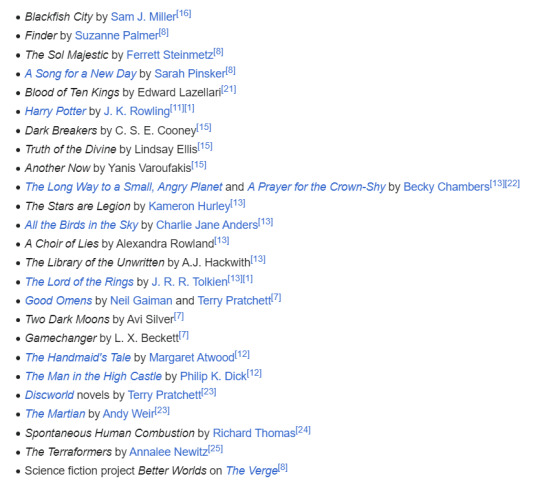
Because really, the list kinda does not work in any way. Like, sure, I can see it with some stories on there - the Terry Pratchett stuff for example - but... Not to show off my hate for JKR, but how is Harry "the best we can hope for is the return to the status quo" Potter in any way hopeful? And how does it show radical kindness or empathy?
And the same goes for a few other stories. Like The Handmaid's Tale is a good story, but how is it "the opposite of grimdark"?
Because, yeah, grimdark stories tend to still have a somewhat happy end in most cases. So... Uhm. Yeah, no I don't see it.
And this kinda brings me to the core issue: Hopepunk right now is not really something that is well defined. It is very vague, so that you can take half of all stories and argue that "oh yeah, totally Hopepunk". And because of that... I do not really see it working as a genre.
17 notes
·
View notes
Note
I recently did a few polls on my yt channel community page - which (ok not many people votes so the data may be irrelevant) seem to have kinda shocking results - it showed that the Baba Yaga arc in the manga, contrary to my belief, was not the most popular part of the manga - and to the contrary, maybe the least liked part.
So that made me curious, is the only arc I as a famous dick that shits on the manga too much like actually not that good?
What is your oppinion on the Baba Yaga arc,especially compared to the following manga arcs?
It's pretty strong to be honest. Vwry strong, with good villains, good character moments, and set in motion by manga Maka's greatest moment of weakness, when she was too much of a coward to either confront and talk to Crona about learning about medusa and then go from there, or go to the higher ups about it, which would have had crona suffer the consequences.
Instead she hides it all away, like a coward, unable to decide on a course of action and what it could lead to.
And she is punished for it by being separated From Crona, which thematically means that her moment of weakness set into motion the entire rest of the series.
And unlike a lot of shonen arcs, the story does NOT end on a happy note, at least not for Maka, as while arachne and her faction is defeated, medusa used her like a puppet, and didn't hive her any hints of where Crona was, meaning that for Maka it was all for nothing.
Amd thats just our main character's journey. There is plenty more.
No the problem with the arc, and the reason why i think a lot of people might sour on it, is that taken as it's own, the manga version of the arc is great... But the anime version has the benefit of leading directly into the final part of the story, and so while it doesnt aim as high from a character standpoint regarding the whole archne/medusa plot, it works just fine as the events that sets the final battle into motion.
By contrast the manga version is soured by everything that comes after.
Noah is the single most forgettable and BORING villain in all of Soul Eater, with his faction being little better, and so his defeat of Musquito and kidnapping Kid doesnt feel particularily interesting when you know where it leads as it's extremely dissapointing.
The whole Liz and Patty being on their own, starts off interesting as post timeskip Patty seems to be completely losing it and backtracking to who she used to be, but it doesnt go anywhere.
Black Star is pretty much the only one of the characters who gets a good outcome, as while the following arc is rather shit, his development from Mizune's death and eventual rematch with kid is the best part of that arc.
The single worst off though, Is Maka.

The baba yaga arc should for Maka, have been what the whitebeard war saga was for luffy. A great story, where all of her efforts are ultimately all for absolutely nothing.
The point of ultimate failure who's effects would define her decisions from then on.
But that's not what happens, because while Maka has a lot of nice moments after this, the climax of the arc is where Maka's journey as a coherent journey where you can trace her development in a logical manner ends.
The timeskip afterwards, rather than have her being utterly depressed or angry at the world, at Medusa and most of all at herself, instead has her in a great mood, and playing around with wanting to look cute, which isnt out of character per say(as maka is defintily a tomboy with a girly streak) but is utterly BAFFLING to have her be like this at this point when she should have been at her lowest.
And following that, her next development is her fears of holding Soul back after he became a death scythe? Like... That could have worked if the development post timeskip was about her having come developed a svere self hatred for failing Crona with her moment of weakness, but that really is not the way it's portrayed at all.
Her interaction with Crona post this is something i have covered before, as while there is plenty of great stuff there, the whole package is utterly ruined by the terrible ending the manga ultimately got.
Overall, the baba yaga arc is good on its own, but it very much marks the point where the manga had reached a clear and coherent direction(after some early less than perfect chapters) to the point where afterwards it would begin to spin it's wheels.
11 notes
·
View notes
Text
Seasonal Reflection: Spring 2023 Anime
Now that’s more fucking like it. I was feeling pretty down on anime after a disappointing winter season, but spring has come in like a freight train to remind us why this medium is so damn important (just in time for summer to let us down again because my god this new crop of shows is looking thiiiiiiiiiiin). Making the choice not to stick with shows I wasn’t enjoying just for the sake of completion was clearly the right call, because not only did that leave me with fewer bad shows sucking my my free time and motivation, it meant I was able to much more happily appreciate the bevy of excellent offerings that Spring 2023 had to offer. From an absolute top-tier run of rom-coms to a slew of entrancing fantasy series, I was never at a loss for things to enjoy. I’ve already shared by thoughts on Vinland Saga’s flawed but excellent second season (8/10) and the abysmal, overrated trash heap that was Oshi no Ko (3/10), as well as quick thoughts on all the series I ended up dropping. But if you want to know my thoughts on the other shows I watched to completion? Then read on, and see which spring offerings are worth checking out!
Uma Musume To the Top: 4/10

One of these days, I’ll be able to better articulate why this franchise leaves me so cold. What is it about Uma Musume that made fans go gaga for historical racehorses anthropomorphized as cute anime idol horsegirls that I’m not getting? Cause from where I’m sitting, the whole thing is just a bloated, overwrought exercise in hacky melodrama and shrink-wrapped moeblob pandering with the occasional actually pretty decent sports anime arc thrown in there. The whole thing just feels so cynical and calculating, from its lazily slapped-together premise that feels like three random popular anime genres shoved in a blender with no rhyme or reason to the obnoxious soap-opera histrionics that define its attempts at tugging your heartstrings. And while this 4-episode OVA certainly has the best, most exhilaration animation of the bunch- seriously- it is stunning how good the racing looks- it also makes the unforgivable mistake of having zero Gold Ship content. They got rid of the funniest character in the show and I will never forgive them for it.
Kubo Won’t Let Me Be Invisible: 4.5/10

I think 2023 is the year that something officially snapped in me. I have just entirely lost patience with middling rom-coms that exist for no other reason than to sell the fantasy of a perfect manic pixie dream girl who’ll love your totally bland forgettable self. I mean, not like I had much patience for them to begin with in the first place, but watching Kubo Won’t Let Me Be Invisible felt like staring the futility of mindless wish fulfillment itself in the face. Does it have some good jokes? Yeah. Is the animation pleasing enough? Sure. But between the embarrassingly forced whimsy in the soundtrack and the treacly sweet presentation that tarts up this bargain-bin Takagi-san like some sweeping, romantic ideal, the inherent emptiness at the heart of the fantasy it’s selling just becomes impossible to ignore. Boys, I beg you: get higher standards for yourself and the shows you watch. You will not cure your loneliness by losing yourself in the illusion of a perfectly sweet, doting girlfriend who’ll never ask you to outgrow the things you hate about yourself. You deserve better than settling for endless self-indulgence at the hands of an industry that doesn’t believe you’re capable of more than that. Or just, you know, at least only watch anime of this kind that actually are good, compelling stories in their own right with more to say than “Gee, wouldn’t it be great if Kana Hanazawa was the only person in the whole world who I mattered to?” There’s even one of those later in this list! You don’t have to settle for mediocrity! Seriously!
My Home Hero: 4.5/10
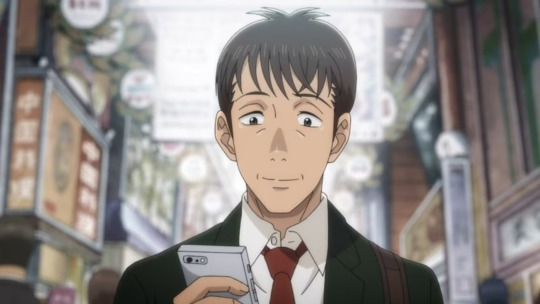
I feel bad for this show, because it’s one of those cases where it’s obvious you’re getting a vastly inferior version of the story. The concept of a cat-and-mouse thriller where the protagonists are just a normal family of everyday middle-class busybodies trying to outwit a yakuza conspiracy after killing one of their goons is a pretty unique one, and the writing goes a long way to sell out on the fact that these are just an ordinary middle-aged couple thrust into a hectic situation and doing their best with the limited skills at their disposal. Even if the writing can be overly convenient at times with how much they’re able to plan ahead, there’s some good stuff here. Unfortunately, it was adapted to anime by Tezuko Productions, one of the most bafflingly incompetent studios to still get reliable work. So the animation falls apart any time it has to depict anything more complex than characters talking and walking, the art direction is uniformly ugly and stilted, and the horrendously conceived score tries so hard to sound epic and edgy that it turns every potentially gut-wrenching moment into a laughingstock of poorly executed melodrama. If you’ve got any interest in this story at all, just go straight for the manga and forget this turd exists.
Yuri is My Job: 5.5/10
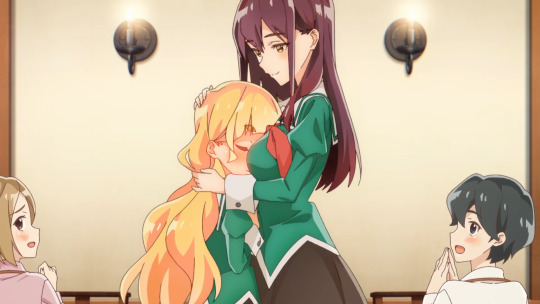
Something to know about me: I hate cringe. And if there’s one type of cringe I can’t stand above all others, it’s watching performers mess up on stage and ruin the show for the audience. As a former theater kid, nothing makes we want to curl up in a ball and die more than a stage play going off the rails and the actors being left lost and adrift while the audience stares and murmurs in worry. I say all this to tell you that I watched Yuri is My Job- a show that is primarily focused on watching actors almost fail in live performance over and over again in the messiest. most emotionally charged ways possible- and I almost managed to make myself like it. What can I say, I’m a sucker for subversive yuri deconstructions that explore the liminal space between ambiguous Class S-style stock yuri tropes and real feelings of lesbian love. Especially when they’re willing to let their characters be this messy and difficult. But man, there were times I had to watch this show with my hands over my eyes from sheer concentrated cringe. Do not let the yuri fool you into thinking this is just another soft and sweet gay girl romance, this shit gets rough. But as long as you have a stronger stomach than me for this kind of thing- and if you don’t ask too many questions about what these girls’ lives are like when they’re not play-acting for customers in a yuri schoolgirl cafe because we never fucking leave this location- you might find something really worthwhile here.
Otaku Elf: 5.5/10

Every season, there’s one anime that sneaks under the radar at first but slowly accrues more and more good will over time, establishing itself as an underappreciated gem for anyone smart enough to go looking for it. And this season, that show was Otaku Elf, an inconsistent but enjoyable blend of chill slice-of-life antics- centered on a young shrine maiden looking after the titular shut-in elf who serves as her temple’s local deity- and bite-sized history lessons about the life and culture of people in Japan’s Edo period. It’s got some surprisingly warm and nuanced character writing for its two leads, and their relationship as they push and pull from different perspectives on life leads to a handful of emotional moments I’d genuinely consider magical. Sadly, the further the show strays outside that central relationship, the less interesting it gets, with most of the side characters- the maiden’s perfectly angelic younger sister, other elves enshrined as deities as their caretakers- coming off as half-baked in comparison. It’s a bit of a crap shoot whether any given episode will pluck at your heartstrings or bore you to tears depending on what it chooses to focus on. But when it’s good, it’s really good, and it’s worth a look for anyone who enjoys historical trivia mixed in with their comfort viewing.
The Ancient Magus’ Bride Season 2: 6/10

In retrospect, I’m really glad I went back and re-evaluated my opinion on Magus Bride season 1 before this new entry came out. Not just because it helped me realize how much I’d underappreciated one of the most captivating fantasy anime of the modern era, but because it drives home that this second season’s sluggish pace is, in fact, an issue. Magus Bride has always been a very slow and ruminative series, trickling through moments like streams through a mud-clogged riverbed en route to its big character moments. But even by those generous standards, this has been sloooooooooooow going. Lots of table setting, lots of new characters with new conflicts, lots of buildup for multiple different plotlines that don’t always feel meaningfully connected and will require a damn good payoff to make this slow start worth it. Luckily we’ve got a second cours coming in the fall, so there’s still plenty of time to turn Chise’s experience at magic college into another worthwhile entry in this powerful series. Until then, I’ll hang tight to the things this series still does well- its primordial depiction of magic, a wonderful soundtrack, the complexities of Chise and Elias’ relationship, Chise’s continued journey toward understanding and cultivating her self-worth- in hopes the end result will be just as magical as what came before.
Birdie Wing Season 2: 6/10

Is there a point where a series who’s primary appeal is how brazenly over-the-top it goes starts to run out of steam? Believe it or not, being stupid and bonkers is an art unto itself, and it takes real talent to sustain. For every Akiba Maid War that constantly ups the ante until it blows its stack with an absolute barn-burner finale, there are countless Highschool of the Deads that slowly dribble away their incredible manic energy over time, leaving nothing behind but the same tired anime cliches as always. And as much as I enjoyed seeing the rollicking madness of Birdie Wing come to close, I can’t deny that I felt my interest starting to slip as this second and final season went on. It just doesn’t do enough to surpass the bar it set with the insane high-stakes golf mafia death matches in the first season. Which I acknowledge is a high bar to clear, but for all the hilariously overdramatic soap opera twists and sudden power-ups that dominate the matches in this season, it never quite manages to measure up to that wonderful madcap energy that made its first season such a lightning-bolt success. Or, I dunno, maybe they shouldn’t have split up the main goddamn couple for basically the entire season. Especially when the same studio was already doing another, much better handled lesbian separation arc over in G-Witch. Seriously, Sunrise, anything you want to get off your chest? I feel like you might have some issues.
Ranking of Kings: Treasure Chest of Courage: 7.5/10
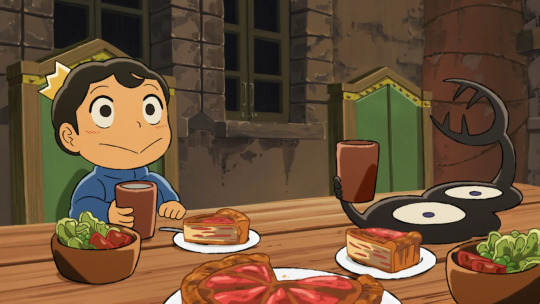
It feels like we’re heading into a very bizarre trend in side story “season 2″s lately. First Ranking of Kings, Horimiya next season, and the Quintessential Quintuplets somewhere down the line, so many shows are spending entire seasons on side content going through stuff from the source material they either skipped over or rushed through. And I can’t help but worry that sets a bad precedent for anime adaptations; we seriously do not need to legitimize shows hacking their source material to pieces for the sake of modern broadcast standards any more than they already are. On the other hand, though... man, it’s hard to complain when the end result does such a great job living up to its source. The Treasure Chest of Courage is every bit as whimsical, emotional, and gorgeously animated as the first season of Ranking of Kings, all the same heart and imagination in bite-sized pieces exploring the finer details in ways that make you appreciate the base story even more. It even fixes a few of my big issues with the main show’s back half and sets things up for an apparent proper season 2 sometime in the future! We’ll see if Horimiya and Quints can keep up those high standards, but for now, this is an exceptional interquel that’s bound to make you fall in love with one of anime’s best modern fantasy yarns all over again.
The Dangers in My Heart: 7.5/10
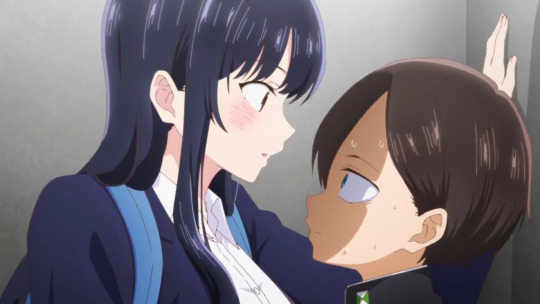
If you started watching The Dangers in My Heart only to drop it after the very first scene, I can’t blame you. The prospect of putting up with a school-shooter level misanthropic loner of a protagonist gleefully fantasizing about brutalizing his crush was almost enough to make me nope out right away. But thank god I kept watching, because once you get past that horrifically unrepresentative opening scene, it quickly becomes clear that The Dangers in My Heart is actually a genuinely wonderful little rom-com that fully understands just how much edgelord middle school nonsense is just insecure kids trying to figure out their place in the world. So few rom-coms like this really get the precise blend of hormones, awkwardness, insecurity, and cringe that defines so many middle school foibles, let alone one that understands the interiority of its female characters well enough to make them feel more fleshed out than trophy wives. But this show nails that early adolescent hellscape without ever coming off exploitative of it (well, almost; there are some obnoxious fanservice moments that really didn’t need to exist, thankfully few and far between). And really, who else but the director of the similarly true-to-life Teasing Master Takagi-san could pull that off so well? Just make it through that opening scene and you’ll very quickly find yourself falling for these idiots just like I did.
My Love Story with Yamada-kun at Lv999: 8/10

God, it’s so fucking good to have shoujo rom-coms again. We went through such a drought period where the genre basically faded into nonexistence save for the Fruits Basket remake, but it feels like they’re finally coming back into fashion. And what better way to remind the world how marvelous the world of shoujo romance can be than another collaboration between the studio and director that graced us with the masterpiece My Love Story back in 2015... with another show called My Love Story? You couldn’t ask for a more surefire winning formula, and sure enough My Love Story with Yamada-kun at Lv999 is a delight from start to finish. It’s nominally about failgirl extraordinaire Akane meeting the socially awkward and emotionally distant hot boy Yamada through the RPG they play together, but the game stuff is actually a pretty small part of it. At heart, this show is about the messiness of young adulthood, and the ways people fumble through the highs and lows of coming of age as they develop into fully concrete people. And it captures that chaos with all the sharp, creative direction, thoughtful character writing, and feel-good romantic fireworks you should expect from this creative team. It’s a gut-busting, feel-good, achingly sincere gem of a show, and I recommend it to everyone in need of a little more whimsy in your life.
Skip and Loafer: 8.5/10

It’s absolutely insane to me that the Skip and Loafer manga is published in the same seinen magazine as Vinland Saga, because this is one of the most authentically shoujo teen coming-of-age delights we’ve had in a long time. Small-town girl Mitsumi moves to the big city to excel at a prestigious high school and make her dreams of rebuilding her hometown come true, only to have her perfect plans derailed by the chaos of growing up, from friends to crushes to high school curveballs. It’s so rare for a story to capture adolescence this authentically, the moments both big and small that define our paths toward maturity as we begin to figure out who we want to be. Watching Skip and Loafer made me reflect on my own high school experiences, good and bad alike, and be grateful for all the steps I took that brought me to where I am today. And any show that can get me so introspective about myself is a show worth celebrating. Plus it’s got the legendary Tomoyo Kurosawa in the leading role, and it’s got a prominent adult trans side character (Nao-chan is perfect and needs more screentime in season 2 or I riot), and the OP makes my cheeks hurt from smiling too hard... yeah, PA works has once again knocked it out of the park. Somebody stop them, they’re growing too powerful!
Heavenly Delusion: 8.5/10
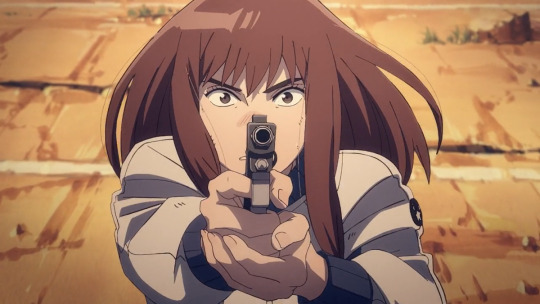
To summarize Heavenly Delusion in a single sentence is, I’m afraid, impossible. I could say it’s a post-apocalyptic mystery thriller that feels like the love child of Shinsekai Yori and The Promised Neverland, but that doesn’t quite do it justice. I could say it’s a dizzying double-track story that does a better job than pretty much any other series as letting you pick up clues on your own, but that’s doesn’t tell you enough either. I could say it’s host to one of the most staggering, masterpiece anime productions ever put to television with no shortage of the greatest singular episodes and individual cuts I’ve ever seen, but even that falls short. I could even say it’s a deeply flawed, intensely problematic series that’s trying to unpack so many different ideas about gender and sexuality with no guardrails to keep it from hurtling off track, but even that leaves out so much. Ultimately, though, the only way I can describe Heavenly Delusion is that it is Heavenly Fucking Delusion, and it’s one of the single most mesmerizing anime I’ve ever had the pleasure to watch. It’s a tour-de-force capital-E Event the likes of which we so rarely get nowadays, and if you think you can stomach the dark places it goes in its exploration of humanity’s corrosion and reconstruction, then you absolutely owe it to yourself to give it a watch. Just be aware there’s a content warning for an incredibly upsetting scene of sexual assault near the end, and I mean that seriously. I like to think I’m pretty desensitized and even I felt kind of sick and unclean by the time that scene was over. Watch at your own discretion.
Insomniacs After School: 8.5/10
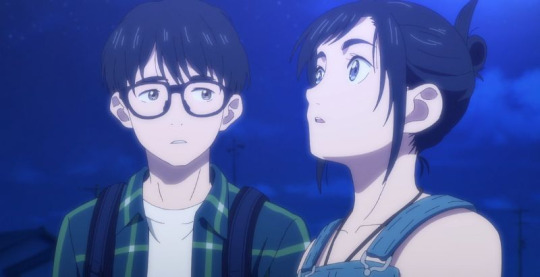
So fun fact: this is the rare series where I’ve actually read the manga before the anime was even announced! One of my Discord friends introduced me to Insomniacs After School, and despite my normal aversion to manga, I fell helplessly, recklessly head over heels in love with it. And if this adaptation made you feel any inch of that magic, then you owe it to yourself to check out the manga right away. Not just because there’s more story to cover beyond the anime’s admittedly pretty perfect stopping point, but because Lidenfilms’ workmanlike production is only able to capture, like 70% of what makes this series so special. And this stirring tale of two insomniacs learning to navigate the trauma of their sleepless nights together deserves to be experienced at its full, unblemished power. It’s an absolutely wonderful slow-burn romance that captures the nuances of teenage friend groups and coming of age like so few series I’ve consumed, and its portrayal of Nakami and Magari’s growing companionship under the night sky is sure to melt your heart into a sugary-sweet puddle. It’ll make you learn for your lost youth more palpably than any other show you’re likely to watch this year. And even in a season already jammed to the gills with exemplary rom-coms that really, truly get what it means to be a teenager or young adult, this slightly subpar take on the material still stands head and shoulders above them all.
Mobile Suit Gundam: the Witch from Mercury Season 2: 9/10
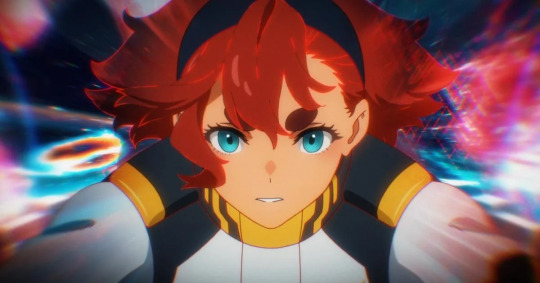
Be honest: did any other show even have a shot? For all the wonderfully realistic rom-coms and ambitious seinen mindfucks this season gave us, there was only ever one true contender to the throne. And I’m thrilled to say that after a fantastic first season putting all the pieces in perfect order, Gundam: Witch From Mercury stuck the landing with a riveting second season that smashed the game board and sent everything spiraling out of control in the best way possible. It’s like Ichiro Ookuchi took all the right lessons from his work on Code Geass- a seamless blend of high school melodrama and gut-wrenching mecha warfare, dizzying plotting that leaves you gasping for breath at the end of every episode, a sheer unrivaled confidence in the chaos of love and war- and refined them to a razor’s edge, delivering a never-ending roller coaster of jaw-dropping battles, explosive emotional payoffs, stunning twists that all make sense in retrospect, tears, laughter, hard choices, flawed characters overcoming their weaknesses, and a true coronation of Suletta and Miroine as one of the all-time great anime yuri couples. At times you can’t help but wish for more time to explore the many worldbuilding details and side characters that fall by the wayside as the chaos takes hold; two cours just isn’t enough to do justice to all the complex, interconnecting ideas this series is juggling. But the fact it works as well as it does, and bring it all home for such a satisfying finale, is proof of just how damn miraculous this series has been from start to finish. I couldn’t ask for a more perfect introduction to this storied franchise, and I couldn’t be more excited to see what this creative team will come up with next. And if you somehow haven’t gotten around to watching it yet? Fix that as soon as possible. You won’t regret it for a second.
#spring 2023 sr#spring 2023#gundam witch from mercury#mobile suit gundam: the witch from mercury#insomniacs after school#kimi wa houkago insomnia#the dangers in my heart#boku no kokoro no yabai yatsu#my home hero#uma musume#uma musume: pretty derby#otaku elf#edomae elf#ranking of kings#birdie wing: golf girls' story#birdie wing#the ancient magus bride#Mahoutsukai no Yome#my love story with yamada-kun at lv999#yamada-kun to lv999 no koi wo suru#kubo won't let me be invisible#kubo-san wa mob wo yurusanai#yuri is my job!#watashi no yuri wa oshigoto desu!#heavenly delusion#tengoku daimakyou#skip and loafer#skip to loafer#the anime binge-watcher#tabw
37 notes
·
View notes
Text
Episode 33 - "Holes Holes Holes" (Show Notes)
listen along here
General New Moon content warning for ongoing discussions of suicide!
[00:02:54] Cassandra Claire’s “Very Secret Diaries” (yes, it's the same Cassandra Clare. She spelled it with an "I" back in her fandom days)
[00:03:49] The Cassandra Claire Plagiarism Saga
[00:04:10] Fanlore's definition of "crack/crackfic"
[00:05:29] Orlando Bloom in Gran Turismo
[00:07:20] The only valid two-party system
[00:08:20] The Poldark TV series and books
[00:13:58] This chapter be like

[00:15:35] What Ioco (and G) mean by “Disney wolves” (why yes G does regret her entire life after having to google “Disney female animals”)

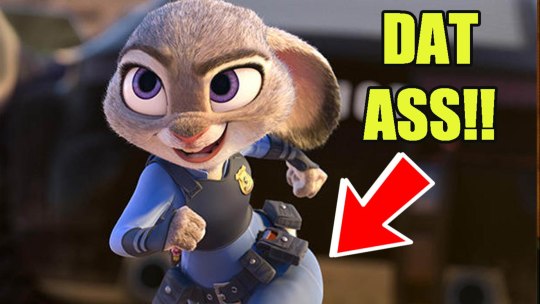
[00:15:46] It's a vine by Lily Zella
[00:20:18] What G means by "Chekhov’s heart problem”
[00:21:03] Waiting Is Not Easy by Mo Willems
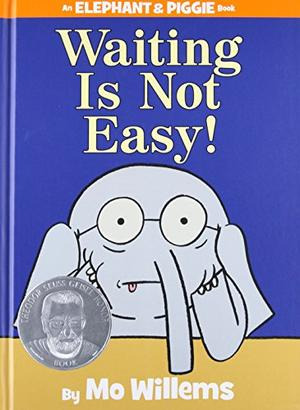
[00:23:52] Bella be like
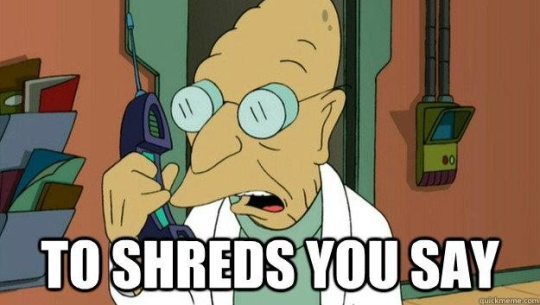
[00:29:13] “Oh my God, he admit it”
[00:29:39] Bella defines “friend” in the New Moon movie
[00:30:43] Poor Angela
[00:31:27] Hank the Tank

[00:31:51] The Wild Animal Sanctuary (which actually IS where Hank the Tank was relocated! G highly recommends a visit next time you're in the Denver area—they also house a ton of the tigers/other animals rescued from the shitty roadside zoo in Tiger King)
[00:33:08] Cocaine Bear (and the true story)
[00:35:33] Shannon can’t go 10 minutes without talking about Gideon the Ninth/the Locked Tomb books (in which someone ends up with an actual hole in their chest. Eat your heart out, Bella)
[00:36:37] One of G’s favorite posts of all time
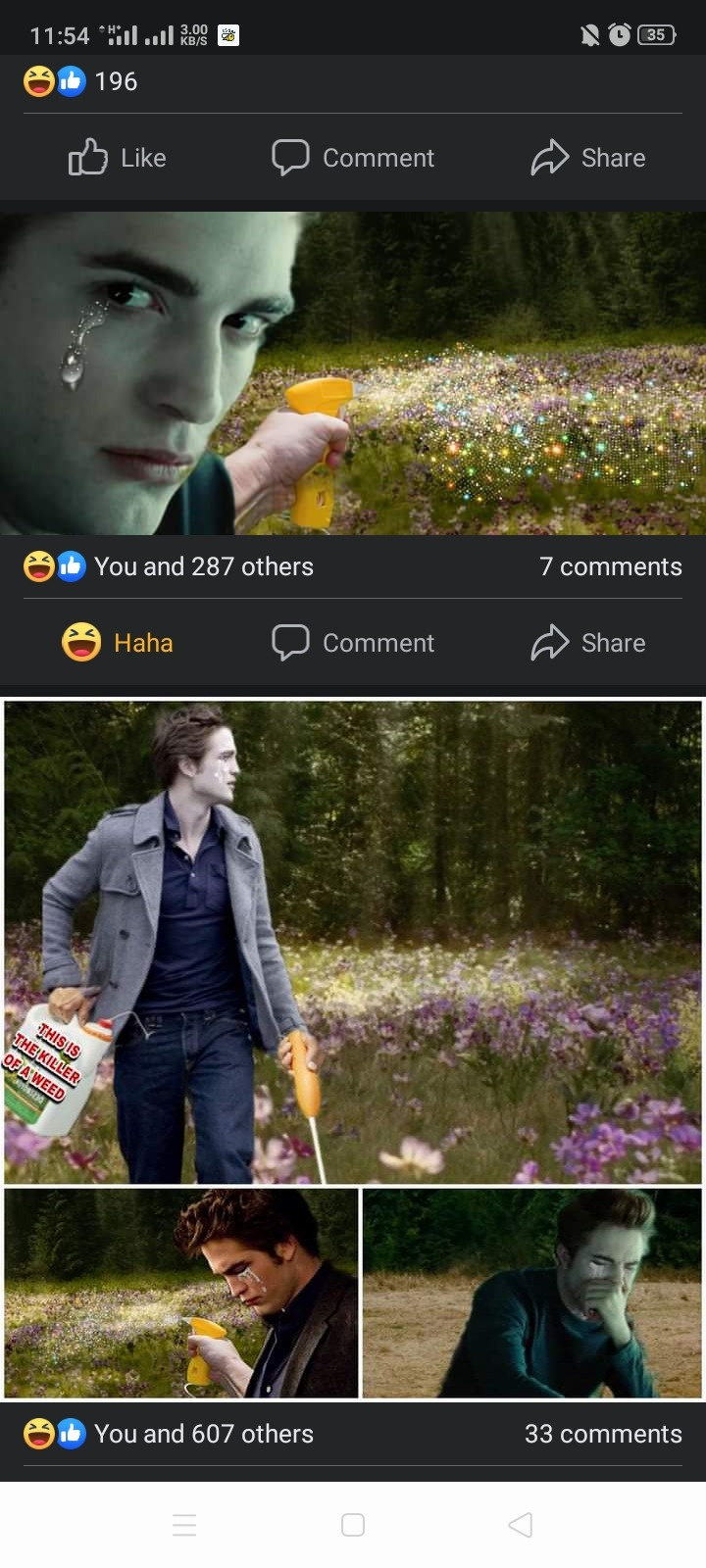
[00:39:37] 10 Things I Hate About You's “tumescent” scene
[00:40:07] Amber talked about reading New Moon before Twilight back in Episode 28
[00:41:01] G did her best to find the originator of this post and failed. Drop us a line if you know who made it!
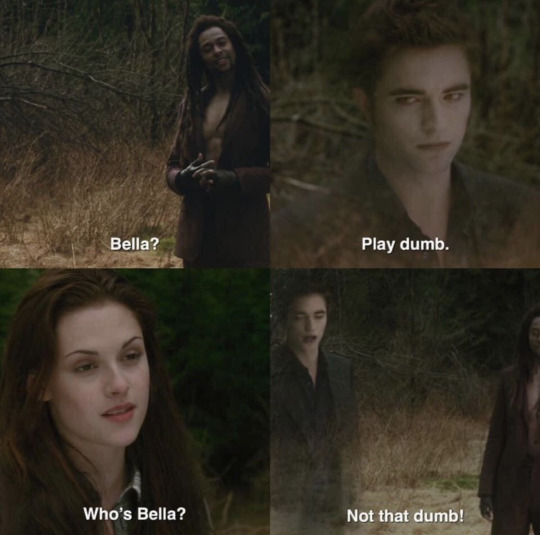
[00:44:14] Human Pet Guy (cw: ableism, body horror, and general ickyness if you click)
[00:58:36] "Bella" running and sobbing in Twilight the Musical (the other thing G is reminded of is this Broad City gif: )

[01:03:22] The sick as hell "Victoria smearing James’ ashes on herself" moment

[01:06:15] "Fucking guy” as coined by Nandor from What We Do in the Shadows (TV)
[01:22:21] The Russian dude nickname that starts with T and is ‘quite funny’ to G’s American ears? “Tit.” (It seems to be mercifully uncommon.)
[01:22:32] The Shadow and Bone series' Tolya
[01:22:52] I Am Dragon is a sillyfun Russian fairytale movie we watched with Bella’s Book Movie Club in summer 2023, and features a minor character named Igor
[01:34:18] Follow Ioco @iocococo here on Tumblr!
[01:34:40] Bella's Book Club's December book info and events calendar
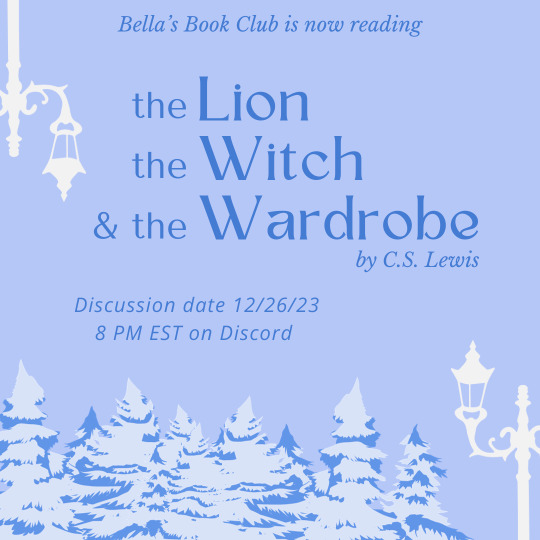

Thanks for show-noting along as always! See you in 2024 :D
#show notes#episode 33#twilight#podcast#twilight podcast#new moon#midnight sun#life and death#twilight saga#the twilight saga#twilight renaissance
7 notes
·
View notes
Text
tagged by @iamdexter123. Thanks!
Rules: A challenge to give your Top 10 favourite characters, based on their ESSENCE. They have to be favourite characters that also have a deeper literary value, where you enjoy their specific role in the story, and this means that the list also should exclude characters that would normally count as favourites if for purely nostalgic reasons. They can be from film, tv, or written media, anything
Oh gods. Um. This is going to be Hard isn't it.
James Flint, Black Sails
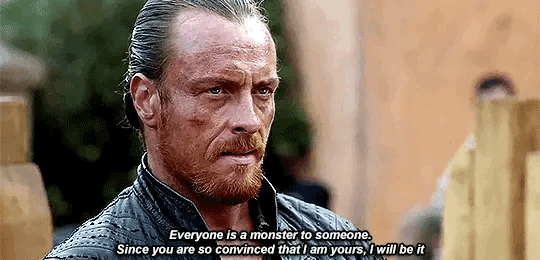
I have loved and will continue to love James "Flint" McGraw both for his place in the story and just in general. His was the story that took me by the shoulders, shook me briskly and whispered "it doesn't have to be like this, the world doesn't have to be this cruel but it is and aren't you tired of it? Aren't you tired of pretending that the status quo is ok? Aren't you ready to make it change?" And he was the main voice for that sentiment that shook me down to my bones.
Farah Dowling, Fate Winx Saga

Farah is a character who has done horrible things. She's been the unthinking protegé of a monster and still came back from the edge. She's someone who took all the pain she experienced and has decided to be kind, even if she struggles with that sometimes, and I love her for it. And she's not motherly, she's more of a wine aunt, but she still cares so deeply about people and that's refreshing too. And of course I love it when I get a female character who is allowed to be complex and also in charge.
Saul Silva, Fate Winx Saga
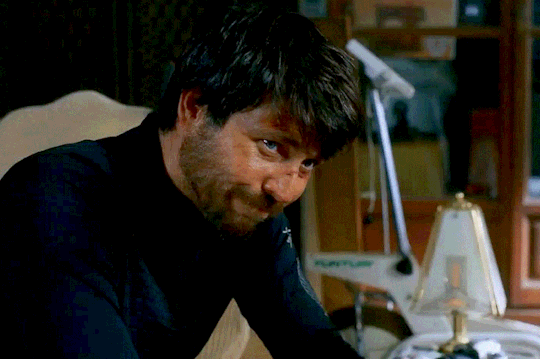
I love Saul for being arguably the most responsible adult in the room at all times and also so deeply, deeply defined by tragedy that I don't think he knows who to be without the guilt he's carrying around with him (I'd love to find out, though). He's got a life that's been deeply shitty in so many ways but he keeps trying to do the right thing, and then there's the way that despite everyone else around him caving and doing things that are questionable or just outright wrong, he's the one with the moral center and the conviction to say "no, I'm not doing this and I wish you wouldn't either" even in the face of danger. Oh - and he's a damsel in distress, which I don't get to see in male characters much.
Daud, Dishonored

*looks at Daud* *looks at Saul* uhhhh, I appear to have a thing about guilt-ridden men who also adopt every kid in sight and who end up getting forgiven by the people they hurt. I just think they're neat, ok?
Charles Vane, Black Sails
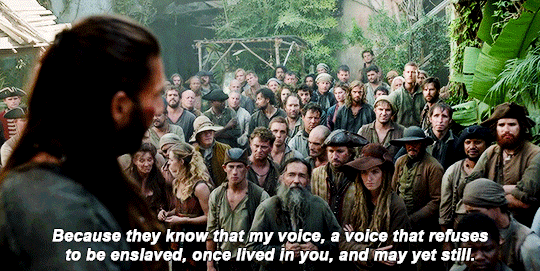
Look. This character has - oh, so many flaws. He's a piece of shit in so many ways, but he's also got some of the rawest lines in this entire damn show, the ones that I'd willingly get tattooed on me so I don't forget them. If you ever need to know what radicalized me, it was probably this guy and everything he said and did from 2x10 on.
Tiago Rodriguez/Raoul Silva, James Bond
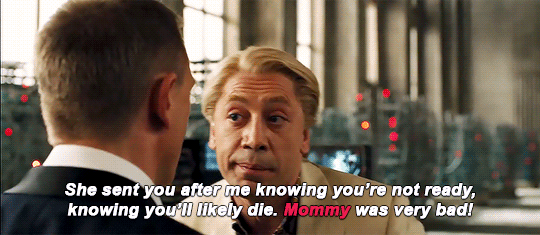
I'm sorry, was I not supposed to like the most stylish villain in a Bond film since...idk, I think the last one with this much personality was probably Elektra King. The brat energy. The little bit of crazy underneath it. The fact that the man had a really valid point and actually succeeded because he set achievable goals. The way he's... not quite sexually aggressive with Bond but also definitely wants to get railed. Fascinating.
Simon Torquill, October Daye
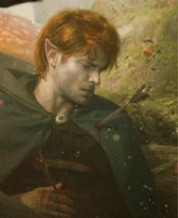
Simon. My darling, best idiot who needs to have someone wrap him in a blanket for about a century and make him as much honey-sweetened tea as he can stand and above all else not allow him to make major decisions until he's had a chance to process the clusterfuck that is his life up til now. I love him, your honor. I love that I get a male character who's allowed to be his own worst enemy but also the kindest, most caring father anyone could ask for when he's not flinging around transformation spells and shooting people with elfshot while being puppeteered by a megalomaniac. And of course I love an actual redemption arc that for once doesn't end in death. Right, Seanan? RIGHT? (jk, I trust her. Mostly).
Rosalind Hale, Fate Winx Saga
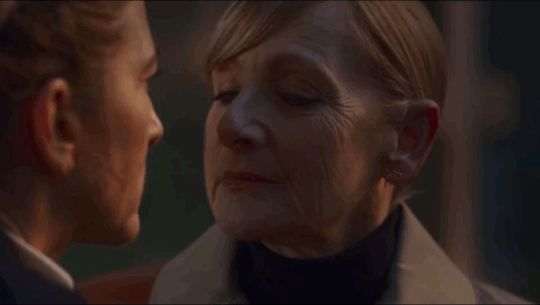
Ok, so. I both hate Rosalind and love her as a character. It's a complicated thing, but I think what I really love about her as a character is that she's a female villain who is creepy as fuck and I wish that the writers had not immediately turned her into... whatever the fuck they were going for in s2. I was much more fond of s1 Rosalind who was an absolute monster who broke the adults in the series so badly and so completely that they're still a pack of emotional wrecks twenty years on. I wanted her to stay that monster instead of being written as a butch lesbian who's just very done with everyone's shit and occasionally given to a bit of torture. I wanted a better look at what she did to Farah, and to Ben Harvey, and for someone to spell out in great detail that she took Andreas and broke him down to be her attack dog from the time he was sixteen.
Basically I love the potential of the character but if she turned up in front of me I would be compelled to stab her quickly.
Javik, Mass Effect
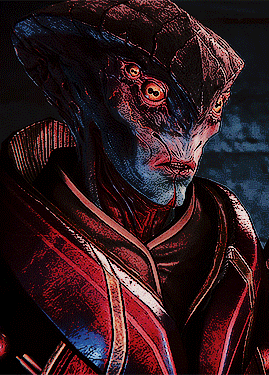
There's something about Javik that I keep coming back to and I think it's the sheer weight of what he represents. One individual out of trillions still alive. Shepard's mirror image, but his mission went to hell and his people all died and now he's awake again and it has to feel like a kind of torture. And yet, for all that, Javik's character arc is about hope. It's about picking yourself up, or rather being picked up, and figuring out how to live again. If you do everything right, Javik gets to see the end of the Reapers and the end of the carnage. He gets to live, and grow, and maybe finally put down his gun and write a book or something, and that's important. We all need a character to remind us that as long as you're alive, there's hope.
Nomi, James Bond
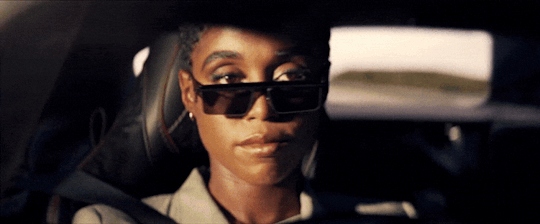
I love her, your honor. If there's one thing the last film got right, it was having three women of color, none of whom had the slightest inclination to fuck Bond, and of the three of them, Nomi is my favorite. I love that she's the new 007. I love that she's there to drag Bond's ass and warn him off her assignment. I love her "Double-0 what?" and I love her "I'll shoot you in the knee. The one that works." I love that she gets to murder racists, and I love that she's got fully as much style as any other 007.
Honorable mentions who didn't make the narrative weight cut or who I just ran out of room for:
Garrus Vakarian, Mass Effect
Mordin Solus, Mass Effect
Anders, Dragon Age
Thomas Barrow, Downton Abbey
Miranda, Black Sails
Madi, Black Sails
Max, Black Sails
Alec Trevelyan, James Bond
Moneypenny (Samantha Bond and Naomi Harris), James Bond
Andreas of Eraklyon, Fate Winx Saga
Tagging anyone who wants to do this, as well as @skloomdumpster, @septemberrie, @djino04, and @penflicks
8 notes
·
View notes
Text
Book Review: 'The Saga of Tanya the Evil' #11
The Saga of Tanya the Evil, Vol. 11: Alea Iacta Est by Carlo Zen

alternate history
fantasy
magic
social commentary
violence
war fiction
My rating: 4 of 5 stars
An intellectual schism rests upon the bent-over shoulders of a waning nation's exhausted military. This nation, gaunt from the excess patriotism that war brings, and this military, feeble from having run through its many resources, now lean a bit too heavily into one another, bleary-eyed and uncertain as to which way is up. But this schism. It, too, is ghastly, somnolent, and a bit weary from all the blood and rhetoric. It haunts those who would venture to proclaim, to any who would dare listen, that a solution exists that can put an end to this total war. For readers who have crawled this deep into the trenches with Zen, THE SAGA OF TANYA THE EVIL v11, unsurprisingly, reveals this debate is not about determining which of the two sides is correct; the true challenge of an intellectual schism rests in determining which of the two sides has the power and the will to outlast the other.
And then there's "Plan B." Lieutenant Colonel Tanya von Degurechaff is an unwilling witness to the convergence and deflection of contrasting ideas helmed by the generals Rudersdorf and Zettour. THE SAGA OF TANYA THE EVIL v11 marks the third volume the author has teased this traitorous curiosity in earnest, and readers finally see Tanya bear its full weight. Rudersdorf views the Empire's only way forward through a traditional coup d'etat — the armed/military overthrow of the nation's established governing bodies. It's deliberate; it's a hard landing; it involves making everyone the enemy. Zettour views the Empire's inevitable end more harmoniously — the affectionate intertwining of diplomatic arrogance and the revered antecedent of military gusto. It's academic; it's a soft landing; it involves contingency plans for allies and enemies alike.
But the damage has been done. As Tanya learns in the novel's opening chapter, which comprises 50 pages of debate, a nation whose leadership strides uncompromisingly into anything will surely fail. There is no respect to be had by a nation whose entire youth was burned to death by the flames of war. There is no humble concord to be maintained for the political institutions whose only lingering pride is defined by their erstwhile shortsightedness. There is no victory to be won by military enterprises whose veil of sincerity has worked so damn well, that nobody, even among its most learned and accomplished ranks, will internalize the truth before it is rendered irrelevant.
Whether the empire strives for an impractical, unattainable victory (Rudersdorf) or an extended, neglectful defeat (Zettour), the end is the same. The only difference rests in discerning the extent to which these leaders' insufferable egos will bend to accommodate reality.
THE SAGA OF TANYA THE EVIL v11 discusses this schism at length, only to later devour both semblances whole and forge a third, synthesized version that compels the characters forward. Narratively speaking, this means broaching the question of the Kingdom of Ildoa. Does the Empire invade? Does it invade right now? Does the military suppress the politicians and royalty in its own territory first? Does one branch of the military, the army, impose its will over others? Why won't anybody do anything about the leaked codes?
The Ildoa question has been a non-issue for much of the novel series, and interestingly, or charmingly, the author also does so on purpose for half of the current novel. A series of dramatic and inconvenient events forces the Empire's hand. Specifically, forces General Zettour's hand. Which means Tanya and the Salamander Kampfgruppe will soon head to the amiable southern border at the onset of winter. Talk of treason, unwinnable war, and ad libitum diplomacy crumble under the auspicious blue skies of the Ildoan countryside.
Also, readers catch a deeper glimpse of two curious perspectives: Colonel Lergen and Colonel Colandro, of Ildoa. A full chapter of Lergen's post-war memoirs provides a crucial, if unbearably sad, but regrettably believable account of war-era bias and the self-blinding predilections of men in power.
For example, Counselor Conrad of the Foreign Office warned Lergen, "Diplomacy is... It's almost like alchemy in a way" (page 055), but the colonel's inability to extrapolate the correct meaning of this analogy quickly proves (validates) just how doomed the Empire truly was. Alas, diplomacy isn't about assembling presumptions; it's not about converting one's expectations into something more. Diplomacy is about cobbling together disparate demands; it's a patchwork of ideals, clumsily yet unerringly hammered into a single, substandard but workable truth.
As such, Lergen travels to neutral Ildoa to meet with his counterpart, Colonel Colandro, to discuss the terms of a possible armistice. And in doing so, he makes the ruinous mistake of believing the Empire a nation worthy of setting the pace. After all the Empire has done, does it possess the legitimacy to make demands? Refuse reparations? Declare revisionist borders? Debate a divestment of local political authority? It's a start. But it's not enough. It's nowhere near enough. And when Colandro explains these facts in plain terms, Lergen nearly passes out. The man isn't wrong, per se, merely ignorant. Only later, much later, will Lergen realize the dissolution of war is not enough comfort for those affected by such disaster; only the dissolution of the social, military, and political hierarchies responsible for war will do.
Appropriately, THE SAGA OF TANYA THE EVIL v11 gives readers an idea of the challenges facing their opponents on the peninsula. Colonel Colandro, comfortable in the Ildoan capital, struggles to alert his comrades of the changing balance of power happening in the nearby Empire. But it's not entirely his fault. In a clever narrative twist, one learns that just as Lergen is biased in favor of imperfect reconciliation, so too is Colandro biased in his value estimation. That is to say, both men lack the intellectual diversity required to be more than what they are: cogs in a machine.
As for Colandro and his fellow Ildoans, "the issue, however, was that people often made assessments based on their own values. They believed that others thought the same way they did" (page 181). If one does not view a problem from the perspectives of all key stakeholders, then the solutions raised will be, invariably, inadequate. As such, in the case of the current novel, the consequences are necessarily, comically grand (e.g., An early warning of a coming invasion? No. Couldn't be. Wouldn't dare think of it. Not in a neutral nation.), for "any amount of effort put forward or attempt to resist an enemy invasion meant nothing without truly knowing what it meant to fight an enemy" (page 233).
And so, General Zettour returns to the capital, the Empire marches into Ildoa, Colonel Lergen finds his way to the southern front, and Tanya and her crew of misfits procure for themselves mouthfuls of bread, chocolate, sausages, eggs, and potatoes. This novel shifts the board of possible end-game scenarios for the Empire, but the picture is far from clear. Will war with Ildoa simplify negotiations, or will it complicate them? Will the turmoil between Zettour and Rudersdorf boil over and into the nation's political strata? Will Tanya take the bait of a promotion, only to be forced into compliance with orders she cannot support in good faith? Will a nation whose textbooks fear admission of failure ever learn how to properly process defeat?
❯ ❯ Light-Novel Reviews || ahb writes on Good Reads
#writeblr#review#the saga of tanya the evil#tanya von degurechaff#light novel#yojo senki#carlo zen#alea iacta est#tanya the evil#isekai#幼女戦記#war fiction#alternate history#fantasy fiction#lergen finds his way to the southern front#leadership strides uncompromisingly#intellectual schism
3 notes
·
View notes
Text
The HMS Sylki? Or; Why I Like It, But I Don’t Ship It.
It’s hard to throw a rock at the MCU fandom without hitting someone who adores the character of Loki, as played by Tom Hiddleston. And with good reason - Loki is one of the best characters of the Infinity Saga due to the fact that he is morally grey. He is capable of villainy, but also heroism and he swings back and forth between those two poles as he works through the trauma of his childhood and stunted development.
In the Infinity Saga, we know where this leads - he’s grown just enough to recognize that he wants more than validation through rulership before Thanos cuts all of that potential growth off with his brutal execution, further punctuating the tragedy that is Loki’s fate; his death, just like his life, is used to temper Thor into a hero that will rise to the challenge at hand.
Spoilers are under the cut.
Loki
And then came his first chance to be in the spotlight. In an instant, Loki is ripped away from everything that has defined him - his narcissistic family unit and his role within it, his costume, even his name as he’s often simply referred to as “Variant”. He’s stripped down to his bare essentials and asked to answer the question, “What makes Loki tick?”
This is a question the first season goes back to again and again as Loki is forced into a brutal version of therapy - first confronting his life and his “fate,” which makes him realize that he’s been stripped of agency his entire life. He’s desperately flailing for control when he has never had any, and it has made him cruel in a bid for attention and love. It is the classic setup for narcissistic behavior patterns and it leads to Loki’s greatest fear - being completely and utterly alone.

Sylvie
Sylvie is a version of Loki that could have been - what if the God of Mischief had instead been a Goddess? Well, for one, it’s a bit depressing to realize how much better Odin treated an adopted daughter than a son; Sylvie knew she’d been adopted, she was securely attached to her parents and her people. The scene where she’s arrested by the TVA, she is playing make-believe with herself cast in the role of hero.
That role of Sylvie as hero and warrior is exactly what is projected to not just Loki, but also the audience as we get to know her, her mission and just what motivates her. It’s difficult to argue that Sylvie isn’t the hero of the piece through Episode 6. The TVA believes that the ends justify the means and that any actions they take are justified if it preserves the Sacred Timeline. If that leaves a little girl orphaned and homeless just before you’re preparing to sentence her to be reset in front of a judge who clearly has no care for the fact that this is a child who is not responsible for how she was born, then so be it.
She also displays many of the traits that we’ve identified with the various superheroes of the MCU - she’s self-disciplined, she has a mission, she’s in the right and she knows it. She’s determined to give the entire universe their free will back!

A Narcissistic Romance?
Here’s the crux of what we’re watching; Loki’s journey of learning to love himself in a healthy manner. One of the luxuries of narrative is that we’re able to externalize that story so that the audience can see Loki’s internal state. Because here’s the thing - most narcissists never change, because they have to understand that something is wrong first.
(Side note; I think this is a huge part of Loki’s appeal, and a dangerous piece of it. There are people who look at Loki’s story and fantasize about ‘fixing’ him by being the ones to show him unconditional love, when the crux of the story is about Loki recognizing the need and gaining the agency to start fixing himself).
Loki, however, has had his Infinity Saga growth put on fast-forward and then smacked over the head with it. He knows something is wrong and then he is shown a version of himself that embodies everything he thinks he needs to be in order to address his insecurities.
In the Void, when Kid Loki looks at him and says “You’re different,” Loki immediately demurs. No, he’s not different, but Sylvie is. Sylvie is Loki as Loki thinks he should be. Sylvie is a hero - in a sense, she is the Idealized Version of Loki.
Unfortunately, we all know what happens when you put someone on a pedestal. Sylvie is vulnerable to the same flaws as Loki - she feels cheated out of What Should Have Been. Only, instead of a crown (and the love of her father) she was cheated out of her right to grow up surrounded by her loving family - and her reaction to that injustice is the same as Loki’s; all consuming rage. She will achieve what she believes she deserves - revenge - regardless of the cost to anyone else around her.
This is what makes her betrayal of Loki so heartbreaking. He tells her the truth, with all the benefit of having his story on fast forward - Loki has grown enough to know that killing He Who Remains isn’t going to fix Sylvie’s pain any more than ruling would finally make him happy. Sylvie just shared her ability to enchant with Loki, reassuring him that he was capable of performing it as well because “we’re the same.”
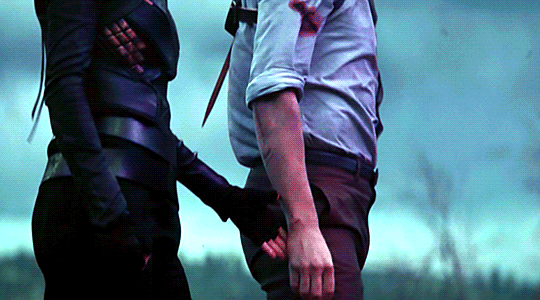
But when she pushes him away, she denies that connection.
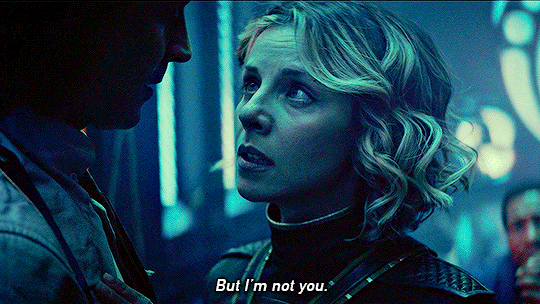
Season 2′s Core Story (Or My Theory, At Least)
So, if the central story of Season 1 was Loki learning a healthier self-love that wasn’t dependent on the approval of his father or besting Thor, then we segue nicely into the next phase of Loki’s healing, which should also address how he will self-regulate his emotions going forth:
How do you forgive yourself after you’ve f***ed up?
Whether or not Sylvie’s decision was actually the wrong one or not is a separate essay - but suffice it to say that on a personal level, she completely and utterly f***ed up and she may have on a cosmic level as well.
But learning to forgive yourself in the wake of mistakes is vital to Loki’s continued growth as a character - so much of his story has been how he’s consumed by his self-hatred that he projects onto others because he is unable to process his emotions on his own. But at the end of Season 1 his worst fear has come true. He’s utterly and completely alone for the first time in his life - there will be no one to project them onto. He won’t even be able to attempt to rule the TVA, a go-to strategy when he’s stressed - because Kang has pretty throughly beaten him to the punch.

If he doesn’t need to ally with Sylvie again to deal with the story of Season 2, I will be shocked because it will give the writers an opportunity to have Loki actively working through how to be angry, empathize and eventually forgive, without being destructive in the process. (Because he is not going to have time or emotional space to both deal with the ramifications of Season 1′s end and indulge in old patterns - one will have to give way to the other.
Not Boarding The HMS Sylki
I think I’ve made a pretty long-winded explanation of why I like the relationship between Loki and Sylvie and why I think it works on a character level. That doesn’t mean I ship it, however.
Some relationships come into our lives and are not meant to be permanent, long-term romantic relationships that end with commitment and families. Sylvie and Loki’s relationship is, as I’ve said before, an externalized view of what is happening within Loki himself. Eventually, however, he is going to need to internalize what this relationship is teaching him and when he does, it will be over. (And the same for Sylvie, honestly - Loki has as much to teach her as she does him).
But learning healthy self-love, as opposed to stunted, conditional love, is what will allow Loki to keep letting go of the narcissism that has shaped his life until now and stunted every other relationship in his life. And that foundation is what will give him the potential to actually step into a more heroic role within the MCU going forward, with the more complex and nuanced understanding that people are just that - people. No one is perfectly virtuous and no one is purely evil, hero or villain.
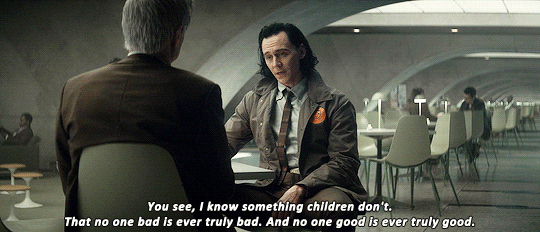
Especially not Loki.
#loki#loki tv show#mcu#meta#essay#character analysis#sylvie#sylki#sylki discourse#sylki kiss#long text post
19 notes
·
View notes
Text
Eternal Words of Love: 10 Timeless Engagement Quotes to Warm Your Heart
Love, an emotion so profound and powerful, tunes hearts to resonate with each other's frequency. As you embark on the journey of commitment, sealing your bond with an engagement, finding the right words to express your deepest emotions could be a challenge. But fear not, for the greatest minds and the most passionate hearts have already delved deep into the realm of love and left us words that echo through ages. This article voyages through ten timeless engagement quotes that capture the essence and warmth of love.
"Love is an irresistible desire to be irresistibly desired." – Robert Frost
Robert Frost's compelling interpretation of love summarizes the mutual hunger for desire that binds two souls together – a perfect sentiment for your engagement announcement.
"We loved with a love which was more than love." – Edgar Allan Poe, "Annabel Lee"
This quote beautifully encapsulates the depth of love, the passion and intensity that transcend the ordinary and break the confines of defined love.
"You are my heart, my life, my one and only thought." – Arthur Conan Doyle, "The White Company"
This quote by Arthur Conan Doyle whispers the omnipresence of your loved one in your life, placing them at the very core of your existence – a devoted love, pure and heartfelt.
"I seem to have loved you in numberless forms, numberless times, in life after life, in age after age forever." – Rabindranath Tagore
This profound sentiment communicates the timeless love transcending the boundaries of birth, life, and age—an eternal bond to celebrate an engagement.
"So, I love you because the entire universe conspired to help me find you." – Paulo Coelho, "The Alchemist"
Acknowledge the serendipity of your union with this impassioned quote by Paulo Coelho, attributing your convergence to the universe's grand plan.
"Love does not consist of gazing at each other, but in looking outward together in the same direction." – Antoine de Saint-Exupéry
This quote underscores not just the promise to stay by each other's side but also an agreement to share a common vision—capturing the essence of a shared future.
"I love you not only for what you are, but for what I am when I am with you." – Roy Croft
Roy Croft paints a love tableau pivoting on transformation—a confession of how love shapes us into better versions of ourselves.
"I carry your heart with me (I carry it in my heart), I am never without it." – E.E. Cummings
Tell the world about your inseparable bond, as E.E. Cummings does—demonstrating love as an everlasting presence in your life.
"Two souls with but a single thought, two hearts that beat as one." – John Keats
Gorgeously depicting the unity between lovers, this John Keats quote reflects the synchronization of two hearts beating in harmony–the true symbolism of an engagement.
"Every heart sings a song, incomplete, until another heart whispers back. Those who wish to sing always find a song. At the touch of a lover, everyone becomes a poet." – Plato
The perfect ending to our radiant list, this quote acknowledges the transformative power of love. Just as a lover turns everyone into a poet, your engagement marks the beginning of your beautiful love saga.
Engagement symbolizes a doorway to a newer, shared life. Every quote on this list unravels the enigmatic beauty of love, providing you with the ‘eternal words of love’ to warm your heart and inspire your announcement. As you choose your favorite, remember that the most special meaning always comes from your shared experiences. It’s your unique love story, after all.
0 notes
Text
How to write a book review
Doing or writing a book review is something that many readers and students need to do to give an account of an important read or book that has had an impact on them. On this page you will also find examples at the bottom of the page of how to write a book review.
What is a book review? A review is a reader's response to the information they have read and the knowledge they have gained, therefore, unlike a summary, it always includes a critical comment, a reading recommendation or at least a personal opinion.
How to write a book review?
Time needed: 10 minutes.
Here are 10 important steps to guide readers and students who want to write a book review, whether it is a review of a novel, a short story, a play, a poetry book or a book of another genre.
Include the publication details of the book
Include the publication and bibliographic data of the book, which edition it is, which year and which publisher. Often these details tell you interesting things about the book. For example, if you have read the tenth edition, it means that the book has been sold out nine times on the market, and that it has been reprinted due to high demand. A new edition means that the book has been successful.
Other information such as the translator, the prologue writer or particular features of the edition also enriches the review. There are differences between different editions of the same work; each publisher includes details of form and sometimes changes the translator.
Write how the book begins and ends
Pay attention to how the book begins and how it ends: the first page contains many clues to what the whole story will be like (not to be confused with the first page of the prologue). In the history of literature there are memorable opening paragraphs (the first paragraph of One Hundred Years of Solitude is a good example). How a narrative begins and how it ends are the gateways into and out of the reading.
Add memorable phrases from the characters and the author.
Making a note of interesting aspects or outstanding phrases is a common habit of every good reader. In books there are true gems of human thought expressed in brilliant sentences that give an account of an entire era, an ideology, a deep feeling or a powerful reflection.
Memorable sentences, those that have made you think and feel something special, are key to defining how to write a review.
Identify the character of the characters
Identifying the personality and character of the main characters is key in any reading. How they express themselves, what they like, what the story says about their habits and philosophy. Ask yourself if the characters are believable, if you believe what they say. In drama there are always two characters in conflict, a hero and a villain, two forces that clash.

Find out what the underlying theme and reflection are
To identify the underlying theme and its relation to real life is to read more deeply. There is a lot of literature that has real philosophical reflections, such as the literature of Borges.
There are many works that have a transcendental background reflection and create a link between literary fiction, myths, our beliefs and everyday life. For example, well-known books such as the Lord of the Rings saga tell us about the struggle between good and evil, and fables always carry a moral that, born in fiction, seeks to apply to real life.
Write some pertinent facts about the author
It is undeniable that there is an author. Although in literary studies it is said that the work, the literary world, is independent of the author, some literature may have marked autobiographical features. It is common for the author to reflect something of his or her life and historical moment in his or her work. For example, Aurore Dupin published under the male pseudonym George Sand, which reflects the difficulty women had in publishing their works in the 19th century.
Contribute your personal experience and critical commentary
When you share your personal experience of reading a book, when you say what you have learned, what it has made you think or dream, you enter into dialogue with the work. And you also connect with other readers who have had their own emotions and learnings from reading the same book.
The personal and subjective experience of reading a book is the effect of the information and knowledge contained in it. It does not matter whether it is a literary work or a journalistic chronicle (such as the book Relato de un naúfrago), a social science book or a popular science book (such as Punset's book Viaje al poder de la mente).
Additionally, in the case of the critical literary review, a critical commentary on the content is included; it is a deeper and better argued opinion that serves as a starting point for a subsequent literary analysis.
Share your reading recommendation
Finally, after a careful reading, could you recommend reading the book? To which audience would you recommend it? The reading recommendation is very important because it can influence, positively or negatively, the sales of a publication. The recommendation has a very important value in this digital age in which social networks are used to share comments and evaluations of all kinds of products. If reading a book has left you with something, why not share it with others?
Answer if the book has a connection with other publications.
Literature is connected. Books are not islands lost in the ocean of entertainment. They are connected through their subject matter, author, genre, style or historical moment. All science fiction books share a common ground; all publications of magical realism or fantasy literature also have points of contact. Include what connections you find to enrich your review.
In addition to the 10 steps mentioned above, the most important thing to do or write a quality review is to have read the book with interest and respect. That is to say, a superficial reading does not generate real learning, and therefore, nothing can be commented on the basis of it. On the contrary, an engaged reading is at the basis of any learning process.
Examples of short story reviews:
The following are examples of short story reviews:
Review of El perseguidor, by Julio Cortazar.
Review of La zarpa (The Paw) by José Emilio Pacheco
Review of Tarde de agosto, by José Emilio Pacheco
Review of El Zahir, by Jorge Luis Borges
Review of The Immortal, by Jorge Luis Borges
Examples of reviews of novels and other works:
The following are some examples of reviews of literary works included in Open Reading.
Reviews of novels
Poetry book reviews
Download this guide as a PDF
If you prefer, you can download a short version of this guide as a PDF if that is more convenient for you. Click on the link below:
1 note
·
View note
Text
i love to watch regis embark on the steep downward trajectory of becoming more and more human towards the ending of the saga…
the palpable shift in his worldview between tower of the swallow and lady of the lake:
between the immortal:
“For since we are clearly and absolutely destined (…) a day or two’s delay makes no difference. And as regards haste, the impression that time is quickly running out is customarily a warning signal enjoining one to reduce the pace, and proceed slowly and with due prudence.”
to the mortal:
“If it is written in the scrolls of destiny,” the sorceress said after a moment, “that Geralt will win Ciri back, then it shall happen. Irrespective of whether the Witcher goes into the mountains or whether he stays in Toussaint. Destiny catches up with people. And not the other way around. Do you understand that? Do you understand that, Lord Regis Terzieff-Godefroy?”
“Better than you think, Madam Vigo. (…) But for me–please forgive me–destiny isn’t a scroll written on by a Great Demiurge, nor the will of heaven, nor the inevitable verdict of some providence or other, but the result of many apparently unconnected facts, events and occurrences. I would be inclined to agree with you that destiny catches up with people … and not just people, but the view that it can’t be the other way around doesn’t convince me. (…) Life may be a dream, may also finish as a dream … but it’s a dream that has to be dreamed actively. Which is why the road awaits us.”
for comparison, to see how drastically his character changed, just take a look at ciri and auberon’s conversation about destiny in chapter 5 of lady of of the lake, the chapter directly following regis’ conversation with fringilla, beauclair and tir ná lia directly paralleled as the otherlands which delay our heroes geralt and ciri, entrap them, prevent from from escaping to rescue one another.
they speak about almost exactly the same thing regis and fringilla spoke of, except here the mortal and immortal take the opposite arguments.
“So it would be better if I went away from here. Right away. Do you understand?’
‘I confess that I don’t quite.’
‘Destiny!’ She took a sip. ‘A force which it’s better not to get in the way of. Which is why I (…) I must get away from here, and hurry to help him … Because it’s my destiny—’
‘Destiny,’ he interrupted, raising his glass. ‘Predestination. Something that is inevitable. A mechanism which means that a practically unlimited number of unforeseeable events must end with the same result and no other. Is that right?’
‘Certainly!’
‘Then whence and wherefore do you wish to go? Drink your wine, enjoy the moment, delight in life. What is to come will come, if it’s inevitable.’
‘Like hell. It’s not that easy.’ (…) She tossed her head. ‘You can’t just sit and do nothing! Nothing comes by itself (…) You can’t waste time unthinkingly! You might overlook the right moment … That one right, unique moment. For time never repeats itself.”
lotl-regis would have taken ciri’s side, hasty and mortal. but just a book ago, just a handful of months ago, ttos-regis would have taken auberon’s side, aloof and ageless.
“What’s half a century?” the vampire smiled. “A moment, a fleeting instant…”
his entire philosophy changed, and for a man defined by his philosophy, that means a lot.
regis’ character, notice it or not, is metamorphizing, changing, becoming tied down to a human scale—by not only the necessity of their quest, but also by his own volition.
because, i mean, it’s not the first time regis disagreed with an aen elle to take an utterly human view on a subject:
as it was described when geralt spoke with avallac’h about preserving tir ná béa arainne:
“(…) A few years will pass and people will simply take all knowledge for themselves, heedless of whether anyone wants to share it with them or not? Including knowledge which you, elf and Sage, cunningly conceal behind cave paintings? Counting on the fact that people will not want to take pickaxes to that wall, painted with the false evidence of primitive human existence? Eh? O, my fire of vanity?”
The elf snorted. Quite cheerfully.
“Oh, yes,” he said. “It would be vanity truly carried to stupidity to believe you wouldn’t smash something. You smash everything. But what of it? What of it, man?”
and later, when geralt brought regis to the same site…:
“So this,” Regis nodded, “is that wall painting. Executed by the elf Avallac’h. The elf who knew a great deal.”
“Yes,” Geralt confirmed dryly. “That’s the painting.”
“The problem is that we’ve thoroughly explored these caves, but there are no traces of any elves, or the other creatures you mentioned.”
“They were here. Now they’ve hidden themselves. Or decamped. (…) On we go, let’s get out of these caverns, comrade. Because all we’ll find here is rheumatism.”
“I agree. Unless … Geralt? Tir ná Béa Arainne, the elven necropolis, according to what you saw, is behind the cave painting, right behind that wall. We could get there if we … you know. Smashed it. Haven’t you thought about that?”
“No. I haven’t.”
my conclusion is that regis is human. by the end, there’s no more ‘pretending to be.’
his imitation, by the time geralt met him, was already perfect, but, it may cease to be imitation, dream, and begin to become a natural state, reality.
as the saying goes… “if it quacks like a duck…”
“He’s already surprised me a few times, so he might still have something up his sleeve. I suspect he’s quite remarkable even among vampires. He imitates humans perfectly, and has done so for years.”
because imitation and mimicry, as we soon learn… once they go on for such a long period of time…
“Returning, however, to your analogies, for us humans the day will always remain the natural time for activity, and the night the natural time for rest. That is our physical structure. During the day, for example, we see better than at night. Except Geralt, who sees just as well at all times, but he’s a mutant. Was it also a question of mutation among vampires?”
“One could call it that,” Regis agreed. “Although I would argue that when mutation is spread over a sufficiently long period it ceases to be mutation and becomes evolution. But what you said about physical structure is apt. Adapting to sunlight was an unpleasant necessity for us. In order to survive, we had to become like humans in that respect. Mimicry, I’d call it. Which had its consequences. To use a metaphor: we lay down in the sick man’s bed.”
it ceases to be intentional mimicry and becomes a default state of being—
which has its consequences.
asides from becoming attached to human lives, which an immortal may or may not do, there’s one thing an immortal will never do, but a human will always do. because the human condition, human life has one specific quality that an immortal life does not:
it ends.
“He who has spilt blood and he who has drunk blood,’ the girl said, her head still lowered, ‘shall pay in blood. Within three days one shall die in the other, and something shall die in each. They shall die inch by inch, piece by piece… And when finally the iron-shod clogs wear out and the tears dry, then the last shreds will pass. Even that which never dies shall die.”
and by the end, regis wholly completes his transition of mimicry-to-evolution, where he does the most human things one could possibly do: says “fuck” and then dies forever.
we may cheer his given title “epitome of humanity,” but as he becomes human, he dooms himself to all the burdens of what it is to be human. including to love and lose, to be condemned to a permanent death. it’s a freedom, but it’s a tragedy. like an angel falling from heaven.
#the witcher books#c: regis#emiel regis#book: baptism of fire#book: tower of the swallow#book: lady of the lake#excerpt#analysis#me writing analysis of regis’ character: im sorry. it will happen again.
40 notes
·
View notes
Text
How to write a book review
Doing or writing a book review is something that many readers and students need to do to give an account of an important read or book that has had an impact on them. On this page you will also find examples at the bottom of the page of how to write a book review.
What is a book review? A review is a reader's response to the information they have read and the knowledge they have gained, therefore, unlike a summary, it always includes a critical comment, a reading recommendation or at least a personal opinion.
How to write a book review?
Time needed: 10 minutes.
Here are 10 important steps to guide readers and students who want to write a book review, whether it is a review of a novel, a short story, a play, a poetry book or a book of another genre.
Include the publication details of the book
Include the publication and bibliographic data of the book, which edition it is, which year and which publisher. Often these details tell you interesting things about the book. For example, if you have read the tenth edition, it means that the book has been sold out nine times on the market, and that it has been reprinted due to high demand. A new edition means that the book has been successful.
Other information such as the translator, the prologue writer or particular features of the edition also enriches the review. There are differences between different editions of the same work; each publisher includes details of form and sometimes changes the translator.
Write how the book begins and ends
Pay attention to how the book begins and how it ends: the first page contains many clues to what the whole story will be like (not to be confused with the first page of the prologue). In the history of literature there are memorable opening paragraphs (the first paragraph of One Hundred Years of Solitude is a good example). How a narrative begins and how it ends are the gateways into and out of the reading.
Add memorable phrases from the characters and the author.
Making a note of interesting aspects or outstanding phrases is a common habit of every good reader. In books there are true gems of human thought expressed in brilliant sentences that give an account of an entire era, an ideology, a deep feeling or a powerful reflection.
Memorable sentences, those that have made you think and feel something special, are key to defining how to write a review.

Include an outline and timeline (optional).
Making an outline of the plot or characters, or making a timeline, can be useful, especially in long novels where there are many characters and some complexity in the narrative.
A good outline can be a good "road map" to avoid getting lost in books with a lot of information. This is especially useful in philosophy, social science and popular science books.
Find out what the underlying theme and reflection are
To identify the underlying theme and its relation to real life is to read more deeply. There is a lot of literature that has real philosophical reflections, such as the literature of Borges.
There are many works that have a transcendental background reflection and create a link between literary fiction, myths, our beliefs and everyday life. For example, well-known books such as the Lord of the Rings saga tell us about the struggle between good and evil, and fables always carry a moral that, born in fiction, seeks to apply to real life.
Write some pertinent facts about the author
It is undeniable that there is an author. Although in literary studies it is said that the work, the literary world, is independent of the author, some literature may have marked autobiographical features. It is common for the author to reflect something of his or her life and historical moment in his or her work. For example, Aurore Dupin published under the male pseudonym George Sand, which reflects the difficulty women had in publishing their works in the 19th century.
Contribute your personal experience and critical commentary
When you share your personal experience of reading a book, when you say what you have learned, what it has made you think or dream, you enter into dialogue with the work. And you also connect with other readers who have had their own emotions and learnings from reading the same book.
The personal and subjective experience of reading a book is the effect of the information and knowledge contained in it. It does not matter whether it is a literary work or a journalistic chronicle (such as the book Relato de un naúfrago), a social science book or a popular science book (such as Punset's book Viaje al poder de la mente).
Additionally, in the case of the critical literary review, a critical commentary on the content is included; it is a deeper and better argued opinion that serves as a starting point for a subsequent literary analysis.
Share your reading recommendation
Finally, after a careful reading, could you recommend reading the book? To which audience would you recommend it? The reading recommendation is very important because it can influence, positively or negatively, the sales of a publication. The recommendation has a very important value in this digital age in which social networks are used to share comments and evaluations of all kinds of products. If reading product reviews has left you with something, why not share it with others?
Answer if the book has a connection with other publications.
Literature is connected. Books are not islands lost in the ocean of entertainment. They are connected through their subject matter, author, genre, style or historical moment. All science fiction books share a common ground; all publications of magical realism or fantasy literature also have points of contact. Include what connections you find to enrich your review.
In addition to the 10 steps mentioned above, the most important thing to do or write a quality review is to have read the book with interest and respect. That is to say, a superficial reading does not generate real learning, and therefore, nothing can be commented on the basis of it. On the contrary, an engaged reading is at the basis of any learning process.
Examples of short story reviews:
The following are examples of short story reviews:
Review of El perseguidor, by Julio Cortazar.
Review of La zarpa (The Paw) by José Emilio Pacheco
Review of Tarde de agosto, by José Emilio Pacheco
Review of El Zahir, by Jorge Luis Borges
Review of The Immortal, by Jorge Luis Borges
Examples of reviews of novels and other works:
The following are some examples of reviews of literary works included in Open Reading.
Reviews of novels
Poetry book reviews
Download this guide as a PDF
If you prefer, you can download a short version of this guide as a PDF if that is more convenient for you. Click on the link below:
1 note
·
View note
Text
Protags by level of Chosen One vibes
1. Minato/Minako Arisato
What are the chances for a robot and the personification of Death to fight just as your family is crossing a bridge near them? The plot of Persona 3 depends almost entirely on the actions taken by Minato/Minako.
They "answer a call" to Iwatodai, they have the potential (whether this is because of their natural talent or because they have Death inside them is anybody's guess), they are immediatly chosen as the leader despite the fact they're one of the newest members, Ryoji gives them the final say in the matter of killing him and it's only them IN THE ENTIRE WORLD with the power to seal Nyx away as a Messiah for humanity... a destiny prophecy would only have been a formality.
Yeah, these ones are Chosen Ones, alright.
2. Akira Kurusu
Instead of being chosen by destiny, this boy was chosen by a higher being. Yaldabaoth elected him and Akechi from the millions of teens in the world to play his rigged game. Everything was ready waiting for Akira to awaken his Persona and confront Akechi. Fated rivals and all that.
Being the one to deliver the final blow to his puppeteer was a plus, not to mention the fact that antagonists have a habit of offering Akira a seat at their table, whether it's as an accomplice, an enforcer or a right hand man. World defining choices, I may add.
Since odds don't matter to Chosen Ones, Akira will confront the man who put him in prison while on his probation.
3. Yu Narukami
Yu wasn't such a Chosen One as the last two, but he sure was elected out of every person who came to Inaba. Not because of who he was, but because of what he could represent.
Again, a rigged game but one not so supervised as P5. The Chosen One aura does linger on Yu. It's mostly a matter of parental pressure and internalized issues that make Yu such a "flawless" person rather than a mystical destiny. Izanami could have chosen Yosuke since he also came to Inaba recently. Naoto could have solved the mystery since she was so close to the answer. Adachi could have slipped and revealed himself on accident to another person.
All of the coincidences in Yu's life make his situation so ridiculous most people could confuse him for a Chosen One.
4. Maya Amano
The fact that she is mentioned in a prophecy ranks her higher than the other two. Unfortunately for Maya, her role in the Oracle of Maia is more Sacrificial Lamb than Chosen One. It was Maya who chose to join Tatsuya's Scooby Doo gang; she could have stayed still where she stood, not contributing anything to the story, and died anyways. Not to mention, that the last spots in this ranking didn't even have the Velvet Room for themselves, but shared it with their entire team.
Maya's role as the final nail in the Oracle of Maia does give her some Chosen One points, which would serve her better during Eternal Punishment. Once more, it were the choices of others (P2IS kiddos) the ones who would make her the protagonist of the next game, not some predetermined fate. The story starts with Tatsuya literally bumping into her by accident.
It was mostly Nyarly's fault that her group of friends ended up in the middle of everything anyways, and it wasn't even supposed to be lile that. Nyarly only wanted Jun to do the dirty work and Maya to die so that Jun would be easier to manipulate. P2? More like Nyarly tries to kill Maya saga.
5. Tatsuya Suou
See above for the chances of the Masked Circle to be the main group. Honestly, Jun is more of a Chosen One that either Maya or Tatsuya. Jun is Anakin while Tatsuya is stuck as Obi-Wan. Could have been anyone in his spot but it turned out that this was better for the main villain, so... up you go, buddy. Now go suffer so I can manipulate your bestie.
The choice to reset the timeline wasn't given entirely to Tatsuya. It was a group decision taken in the heat of the moment by the OG Masked Circle. It was Jun's personal issues that made the Tatsuya gang a target for demons. Before IS, Nyarly couldn't have cared less about biker boi.
However, like Maya, Tatsuya's level of Chosen One augmented in Eternal Punishment. It still wasn't because Destiny Said So, though, mostly because he is stubborn as fuck.
6. Naoya Toudou
My boy Naoya was just chilling at school when shit got real. Every single student in the school could have been the ones to go after Kandori (and by any I mean you, Tamaki) but they were Naoya's friends the ones who decided to go. See: Naoya's friends. Not Naoya. He's here mostly because Maki is his childhood friend and, hey, all his friends are going.
It's also my belief that it was mostly a combination of Maki's reality and Naoya's trauma the ones that gave life to Kazuya/Naoya's shadow, not the fact that he played a key role in Kandori's plan or anything. It just happened.
It also comes to mind the fact that in the manga, Yuka and Yukino were already halfway through the Snow Queen quest when Naoya turned up. He became more extra support than vital piece.
#persona 1#persona 2#persona 3#persona 4#persona 5#naoya toudou#tatsuya suou#maya amano#minato arisato#makoto yuki#minako arisato#hamuko arisato#kotone shiomi#yu narukami#souji seta#akira kurusu#ren amamiya
149 notes
·
View notes
Note
Thanks wanted to know if lara really loved him?and part 2 of your text talking about the ava
That’s a question to which the Saga gives no answer. Yet, interestingly, it does not give a credible answer testifying of the opposite either. What does “really loving” someone mean anyway?
One of the big themes of the Witcher which Sapkowski likes to touch upon is the veracity of the historical narrative. Its falsity. History is written by the victors. Stories are written according to expectations of archetypical designs. There is Good and there is Evil.
The great love story of Lara & Cregennan – of which there are many versions, let’s not forget – is, in my opinion, one of such cases. To take its message of “star-crossed lovers” at face value, an error.
There is as little reason to think Lara did not really love Avallac’h as that she did.
Why I think this concerns the Witcher Saga’s self-awareness of fantasy stereotypes and its desire to subvert them (an elven princess falling hopelessly in love with a common mortal man and forsaking all else is one of those). It also concerns what we can deduce about Lara’s mindset at the time, which influenced her actions, decisions & feelings: from her privileged upbringing, extraordinary role, the influence of power on someone who has always had it, elven cultural background, and relations to her contemporaries. I think the situation was quite complicated on all sides & not straightforward at all.
Personally, I choose to err on the side where I would argue that Lara did love Avallac’h, as my experience tells me feelings & relationships are messy. As love is not uniform nor lasts forever, even when people stay together until their ends. Love changes in accordance to how we change, and it changes us as we change it; and elves have a long time to witness how their feelings can change and transform.
Finally:
somehow I doubt Avallac’h would feel as strongly as he does, even centuries after Lara’s death, if the feelings had not once upon a time been mutual.
Sidenote:
People tend to take the fact of Lara having a child with another man as testament to what a shitty person Crevan must have been. Given Avallac’h’s role in LOTL, I am not surprised, though I think this stance is overall pretty shallow. Who has experienced heartbreak, loss & humiliation can guess, perhaps, how it can alter a person; give a golden cause, almost, to give into darker impulses. (That too says something about them though, doesn’t it? It does. But I sense that before delving into it, it’s good to ask myself whether I feel like being judgy or simply interested in understanding a character – it changes the outcome of the questioning.) It also somewhat reduces Lara's agency, which I think is the greater the more difficult and hopeless the decision she had to make.
Also, in the context of the Saga, Avallac'h is a side-character & has limited exposition; which is to say that if we deny every character-defining plot point as having been legitimate, we're effectively erasing the character's depth & arc in their own right.
Lara having loved/used Avallac’h & Cregennan is more interesting to me than the exclusionary “you can only have one!” paradigm.
Further note:
My little rant about Avallac’h’s character-writing will finish itself one day, hopefully. When I get irked by the nuanceless tarring he receives in the Witcher fandom, probably. It does contain quite a few interpretations I have for Lara's & Avallac'h's relationship though, so perhaps it's good to plug it here. Glad you found it interesting!
-
In follow up to the ask, since of course thoughts come once you’ve hit “post”:
On the note of "history being written by the victors." History is also being written by the survivors. So there's an irony here: by dying, Lara's narrative - the fundamental story that underlies the events of the Witcher Saga - was entirely taken out of her own hands. Everyone else - everyone! - defines her story now that she is gone. Almost nobody knows what really happened.
Except for Avallac’h.
If anyone knows the story of Lara Dorren, it’s probably him. Twisted as this knowledge might be by his own tragedy & hatred, but time herein works its magic in interesting ways - you become aware of your own biases over time. They co-exist in you; your truth, their truth, THE truth. What’s truth?
Hmm.
Avallac'h has all the chance in the world to deny the narrative of “star-crossed lovers”. He does not do that, though. He is fairly ironic and sneering about the “official” tale that circulates among humans & elves, but he does not use the chance during his conversation with Geralt to slander or change that narrative.
There’s an element of genuine respect for the feelings Lara felt at the time; for the feelings that drove everything apart - far, far more than just their relationship. Entire peoples, entire histories. I’d say that’s pretty far from “shitty”.
(But then again, if the story has already twisted so that Avallac’h, among elves, holds the position of a tragic figure then I suppose he has had some salve to his wounds & there’s no point in struggling against the narrative. It’s wonderful how differently you can view this character’s position. And I think elves, above all others, have a unique persepctive on the struggle of man against how history/time sees them - except unlike humans, who agonise over it, they make it their strength & laugh bitterly in its face. You want me to be a villain, I’ll be a villain. You want me to be a saviour, I’ll be that too. You’ll die before you find out, mortal.)
#asks#the witcher#wiedźmin#avallac'h#lara dorren#aen elle#the witcher lore#the witcher meta#andrzej sapkowski#cregennan of lod
21 notes
·
View notes
Text
The Mandalorian: Is He “Better Vader”?
This may sound funny, but please hear me out for a moment.
The further I watch Star Wars’ new live-action tv show, the more I get the impression is that Mando is meant to be a positive version of Darth Vader (the “dark father”).
Father figures usually don’t have a thankful role in this galaxy - either they are absent like Anakin’s, terrifying like Luke’s, or well-meaning but failing in their primary duty of keeping their child safe, like Ben’s.
Not a few fans, though a little mockingly, like to call Kylo Ren “better Anakin” since his conflict is more fleshed out and the whole figure inspires more sympathy. My theory: is Mando meant to be “better Vader”?
It was repeatedly and amply shown that the cause for the never-ending conflicts in the galaxy lie for a large part on the side of the Jedi, whose stuck-up attitude ultimately failed. Their order prohibited personal attachments, and even the wisest among them were not affectionate. This was what drove the all-powerful but passionate Anakin, who desperately wanted to have someone he could love and protect, to his ruin: the moment he finally became a father he also became a ruthless monster. Mando is introduced as a merciless bounty hunter, but as he opens up to the child, he becomes kinder and begins to find friends. He grows even more valiant, but also learns how to be gentle and caring.
Since the Jedi are almost all extinct, but Force-sensitive children still are born throughout the galaxy, we are left with the question of what is to become of them. Some were brought to Luke’s new temple later, but we can assume that not all were identified.
Mando’s little protegee is staying and making life experiences with a guy who doesn’t know anything about the Jedi and has no clue of the source of the child’s mysterious powers, but instinctively does the right things: he keeps him safe, instructs him, scolds him when necessary, and offers him friendship and companionship. (The Mandalorian who adopted him probably was a good father figure, too.) The child never sees his “father’s” face, but nevertheless he trusts him explicitly. Mando is the living proof that coolness and fighting qualities are not opposed to being gentle and caring.
Ben Solo’s tragic fate was the result of failed fatherhood: Luke did not know how to be a father because he had no children of his own and had had no role model, while Han did not trust his capacity to protect his son from his own powers.
The Parallels
Both Vader and Mando are soldiers. Though not Force-sensitive, Mando is extremely strong and well-versed in martial arts; he never shows his face; he wears an armor completed by a black cape which does not seem to have much practical use. He usually speaks only in short, clipped sentences and has a wry, sarcastic kind of humor.
Vader was a follower of the Emperor, factually a slave who had no choice but to obey his master, and wherever he went he wreaked terror. Mando does take jobs from the bounty hunter’s guild, but essentially, he is a free man and often offers his services negotiating on his own terms. Noticeably, he fights against raiders and mercenaries or remnants of the Empire, peace following in his wake.
When he first reaches out for the baby, it looks like the opposite to another famous scene in the saga: here we have the adoptive but good father, while the other was the biological but cruel father. Luke did not take his father’s hand, while the baby instinctively reached out to the man who had protected him.
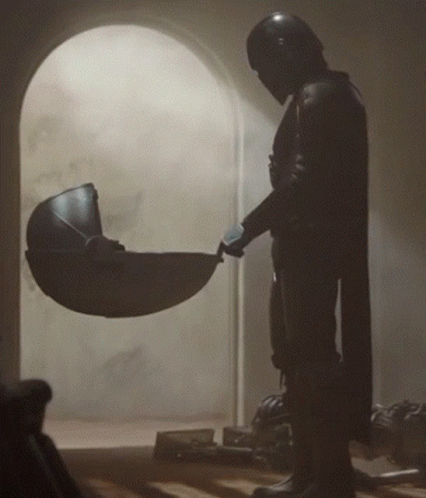

Note also the scenic reversal: one figure is standing on the right side, hand with upturned fingers reaching out into a void, the scene is bathed in cold light. The other figure is standing on the left, hand reaching down, illuminated by warm light.
When we do see his face once, Mando is lying down and helpless like Vader; he is not disfigured though and despite being injured, he is not dying. Shortly after this he finally accepts his task as the child’s father figure, while Vader died a few minutes after his unmasking and could not fulfil his fatherly task any more. Also, in both cases we learned the person’s real name not long before the mask went off: Anakin Skywalker respectively Din Djarin.
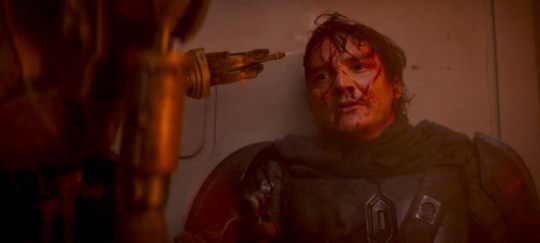
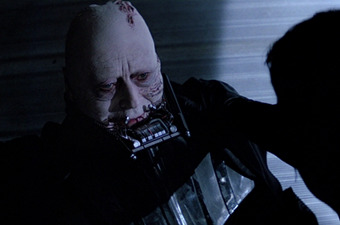
Given the saga’s love for cyclical narrative, this would make a lot of sense. Star Wars is telling us once more how important a protective and kind father is for a child, both as a role model and an attachment figure. We do not know yet how baby Yoda will turn out; but it would have made little sense for the storytellers to think up such a figure in the first place if they didn’t want him to go another (possibly better) way than his more famous predecessor.
Is the galaxy at last healing after the terrible conflicts caused by both Jedi and Sith, and will the good fathers be responsible for a better future, maybe even for the long-awaited Balance in the Force? I hope so.
May the Force be with the Clan of Two. 😉
(On a side note: Vader / Anakin was in his mid-forties when he died. Din Djarin is about the same age.)
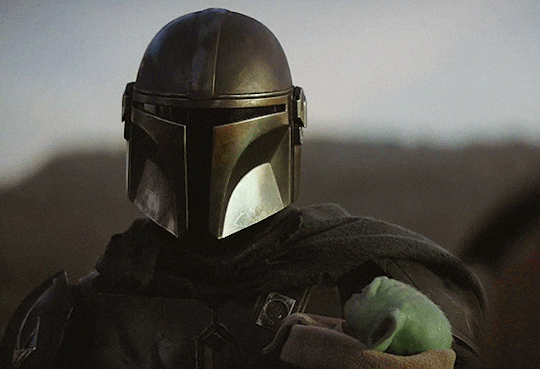
After the closure of Season 2, I would like to add a few details that also set Din Djarin apart from Anakin.
Attachment vs. Affection
Anakin’s greatest weakness was his anxiety to lose the ones he loved. In the end, he sacrificed all of his ideals for the purpose of saving his pregnant wife. Luke also loved his friends and wanted to save them, but in that fateful moment before Palpatine, he realized that he would have had to give up his integrity for the purpose, and that was when he decided to throw away his weapon.
Din suffers deeply when he has to give up “his” child to a literal stranger for an indefinite time. However, he knows that it must be done because he does not have the knowledge to train him. Grogu also, reluctantly, lets go when he sees that his “father” is doing the same. This goes to show, again, that he is much stronger than Anakin.
Following Rules vs Following One’s Heart
Like Anakin / Vader, Din takes his helmet off the moment he has to say goodbye to his child. The famous sentence “Just once, let me look on you with my own eyes” comes to mind. Vader was a Sith Lord and Anakin had been a Jedi. Both adhered strictly to their code: Anakin was a faithful Jedi until he became a Sith and Vader obeyed to the rules of the Sith until for a brief moment he acted like a Jedi again (and, also, like a father, which was a first). Mando unmasks not only before Grogu but also
- Luke, who is a total stranger
- Moff Gideon, an enemy
- Bo-Katan, a possible potential enemy since she pursues the Dark Saber
- Fennec, an ally but not a friend
- Cara, a friend who never saw his face.
That he is willing for all of them to witness the moment he lifts his incognito shows that Mando is finally listening only to his heart. The Way of the Mandalore, which was his guideline for his entire adolescence and adult life (i.e. thirty years or more), has become less significant to him than the bond he has with Grogu.
Anakin’s tragedy was that he could not follow his heart but that some rules defined by an outside source always were in control. He wanted to be a husband and father and loyal friend, a mechanic and a pilot, not a Jedi or a Sith.
Ben Solo’s tragedy was the same; though not born a slave, he also had no choice about what to do with himself and his life. It was either being a Jedi or a Sith. But we know that he wanted to be a son and a lover, and a pilot.
The same fate occurred to Luke, many years later: the kind-hearted, affectionate young man from Tatooine, who so easily befriended everyone and always was compassionate and helpful became aloof and detached on being a Jedi, because he thought that was what this task required. But in the end, it was exactly what made him not understand and even fear his nephew, with disastrous results.
Din Djarin chose the way of the heart, he is no longer adhering to “the Way”: he said himself that now he can’t put his helmet back on. (Alternatively, he could put it on again, but that would mean defying the Way otherwise.) Grogu has witnessed that a man can very well choose family over a code that was taught to him, even if he adhered to it all of his life. Luke is the one who carries him away, but Grogu looks over his shoulder to his “father”. Luke may become his teacher, but Grogu’s role model, his hero, will always be Din; as it was for Ben with his father Han.
Hints at the Future
Anakin died twice: once on Mustafar, where he also lost his blue light sabre, and on the second Death Star, where he had lost the red one. Din Djarin, at the end of this part of this journey, receives a sabre, although he never wanted it.
With the Dark Saber, a new fate is awaiting Mando. Is his destiny that of being the warrior-king, protective and honorable, that ought to have been Anakin’s place? Maybe. As they say, the best leaders are the reluctant ones. 😊
#star wars#sw#read more#the mandalorian#mando#din djarin#baby yoda#anakin skywalker#darth vader#luke skywalker#han solo#the Jedi#father figures#clan of two#kylo ren#ben solo#greef karga#grogu
393 notes
·
View notes
Text
The Voyage So Far: Skypiea
east blue (1 | 2) || alabasta (1 | 2) || skypiea || water 7 || enies lobby || thriller bark || paramount war (1 | 2) || fishman island || punk hazard || dressrosa (1 | 2) || whole cake island || wano (1 | 2)
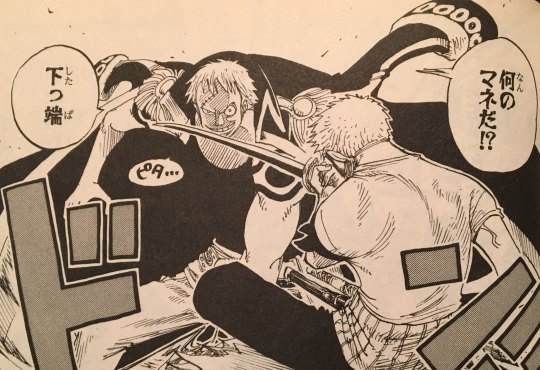
the bar scene in jaya is one i didn’t really get the first time i read it- like nami, i mostly found luffy and zoro’s refusal to fight back frustrating more than anything else. i didn’t realize the connection to shanks in the prologue until someone else pointed it out awhile later, but when i did, it made me appreciate the entire sequence and luffy’s choices a lot more.
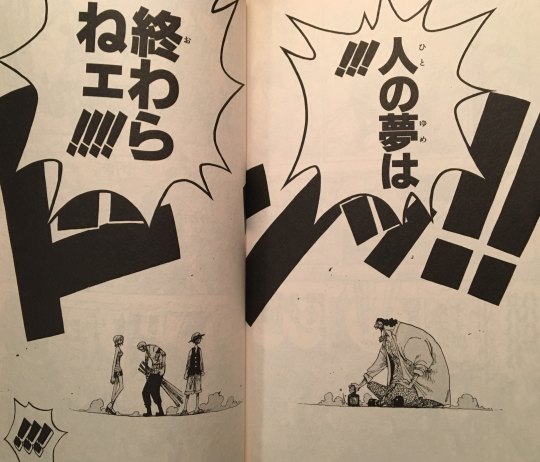
honestly, i know this is one of the pages that gets the most attention from jaya, and it absolutely deserves it. blackbeard here is effectively dropping one of the biggest main themes of the series- people’s dreams don’t end!!- and how interesting that we get that delivered by the antagonist to the protagonist, instead of the other way around? how often do you see a series do that?
and the line hits. look at the emphasis. there’s absolutely nothing on these two pages except for the three strawhats, blackbeard, and blackbeard’s line, bigger than anything else.
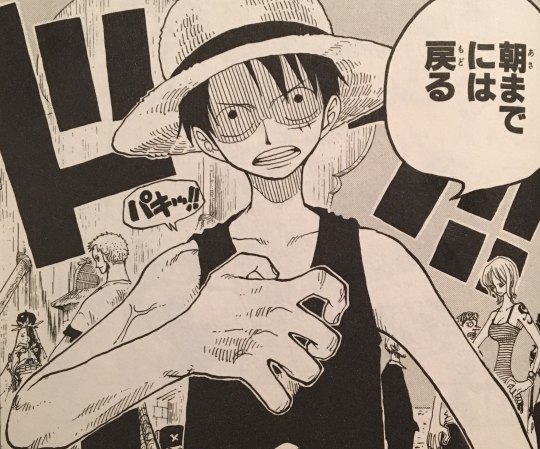
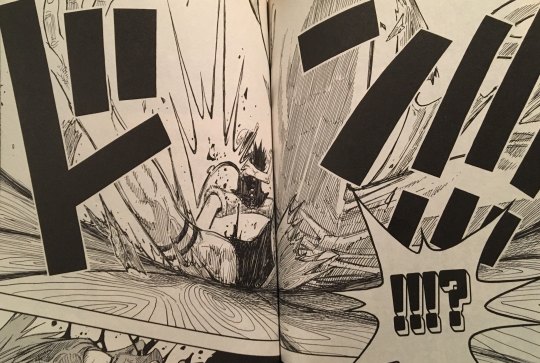
chapter 232, with luffy punching out bellamy in one hit is still, to this day, probably my favorite one piece chapter. it opens with the drunk pirate seeing the newspaper with luffy’s hundred million bounty and realizing just who bellamy was kicking around, and it hits on one of my favorite plot threads of one piece- the growing infamy of the strawhats and luffy in particular, and their rise in the world.
the atmosphere of the whole scene is so good, the tension in their air, the way all the bar patrons jump when luffy yells for bellamy to come out- and when the hit comes, the satisfaction is visceral.
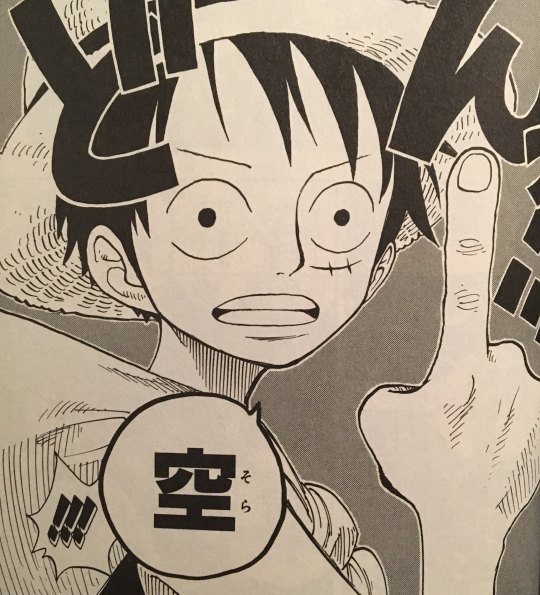
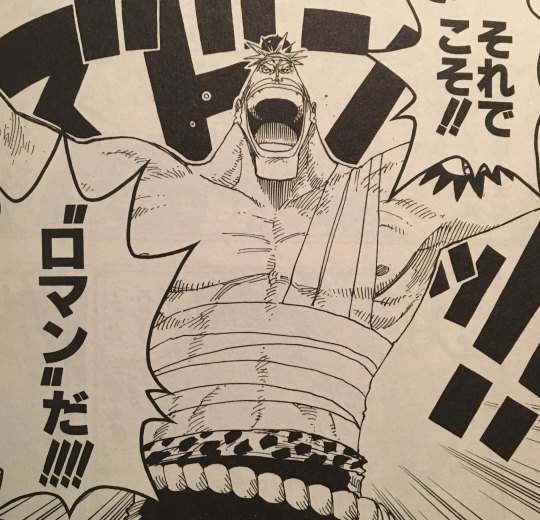
i’ve talked about it before, but god, i LOVE the way one piece defines “romance”- the arthurian kind of romance, the adventurous kind, that romanticizes the world and its wonders- romance dawn. in an arc as thematically heavy as jaya, it makes sense that it, too, is explicitly brought up. can you think of a more romantic, impossible adventure than traveling to the sky?
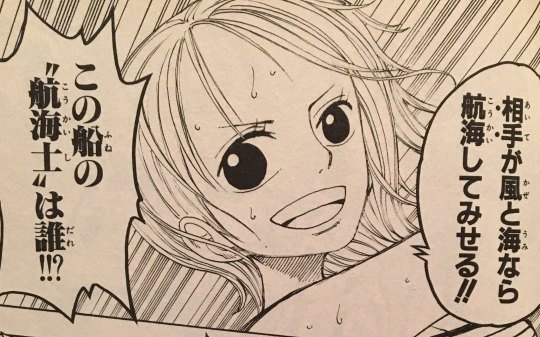
nami’s confidence when faced with the task of navigating into the sky is so fantastic.
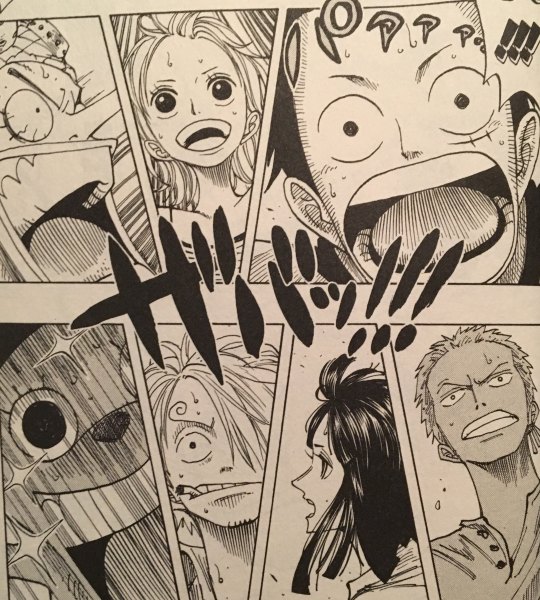
the expressions, and the art in general, in skypiea, are really so lovely. look at the variety between the strawhats when they first emerge from the white-white sea to lay eyes on angel island. look how expressive they all are!! i have such a soft place in my heart for the art in these earlier arcs, honestly.
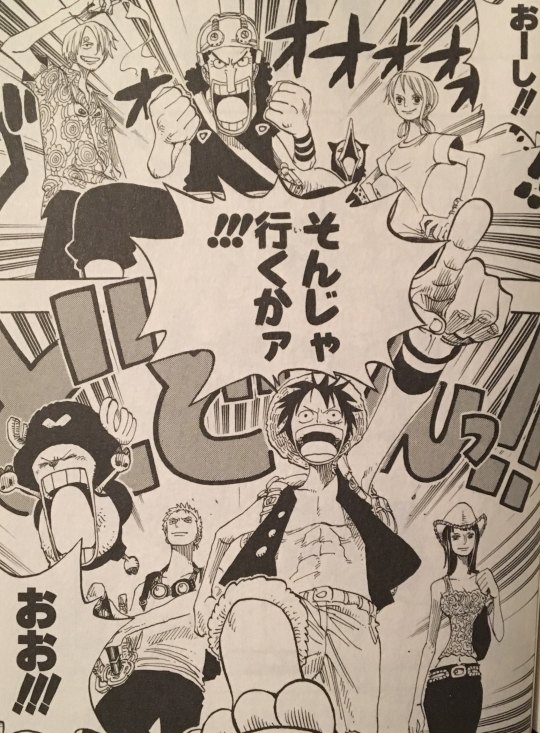
somewhat related to the above: there are so many little moments in skypiea where the strawhats just get to have FUN, and be stupid, and get fleshed out more as characters, and honestly it’s such a delight. also, everyone’s skypiea outfits were just really really good. cowboy hat robin... i miss u every day
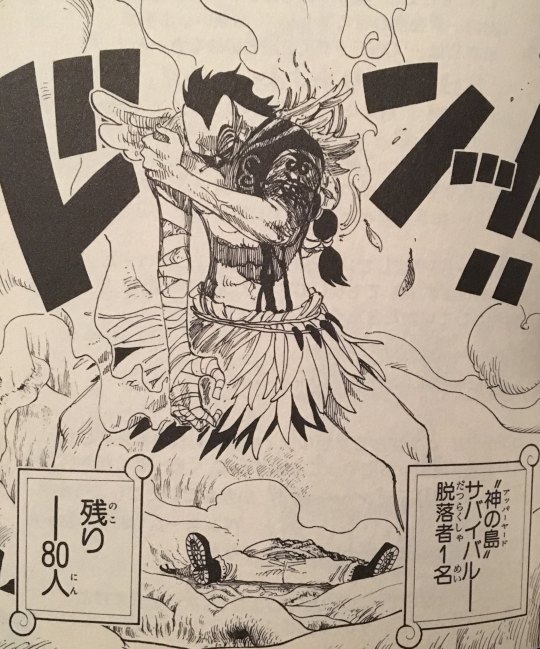
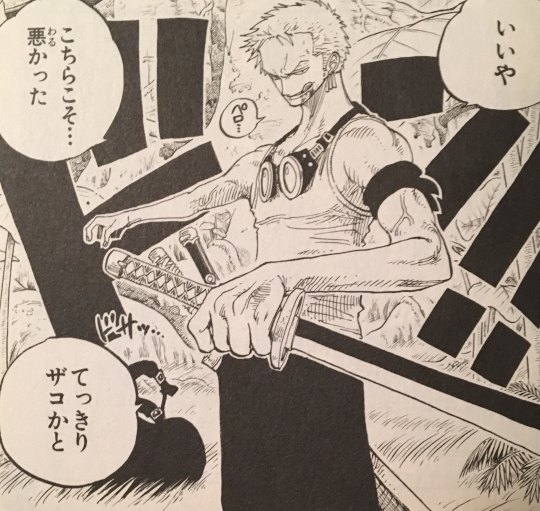
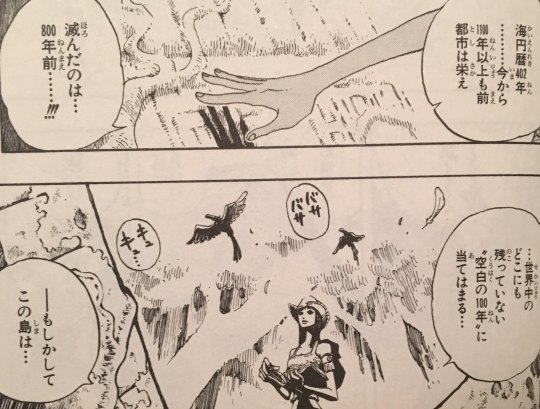
i really like the whole scene where robin is exploring the ruins, and these panels in particular have such a lovely sort of ethereal look to them. i love seeing robin doing archeology, i think for the same reason i love to see sanji cooking- the strawhats are all such cool and passionate people, and it’s really really nice to see them doing and talking about the things they love and excel at most.
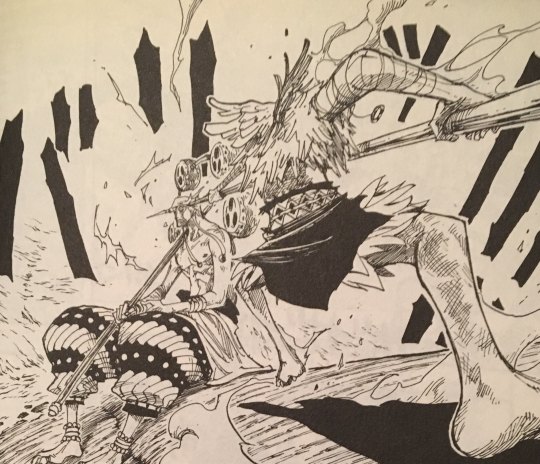
i’m sure i’ve said it before but i LOVE how logia powers are depicted, especially when used to avoid an attack. it’s so cool. ace’s cover story runs through most of this arc, and we get some great examples of it there as well.
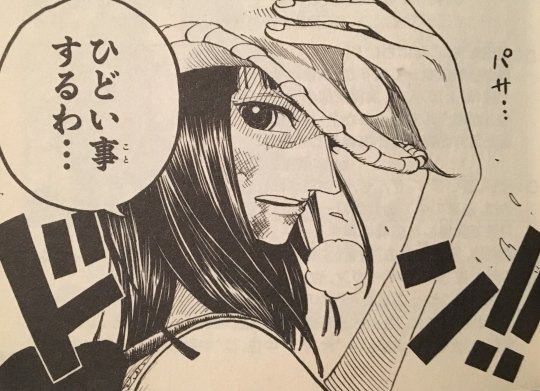
1. wife
2. skypiea is SUCH a good character-building arc for robin- which is good, because the next saga is almost entirely predicated on how much both the audience and the strawhats care about her. it’s here where we learn about her passion for archeology, her reverence for history, and get a much better look at the softer sides of her personality and her fast-growing admiration and affection for the strawhats.
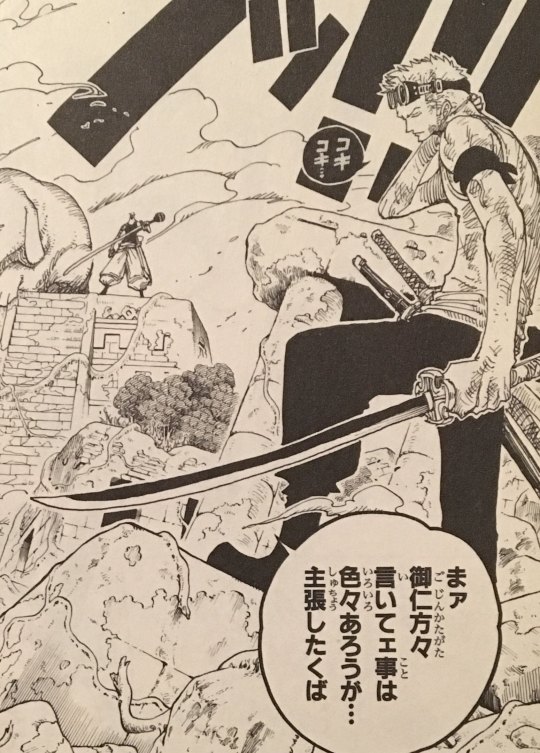

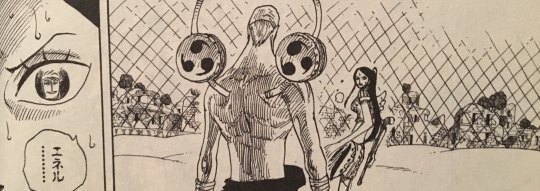
man, enel has so many huge, terrifyingly powerful shows of force throughout this arc, but this right here, this little sequence where he appears behind raki between panels without warning and we see him reflected in her eye, communicates better than absolutely anything else just why he’s a nightmare.
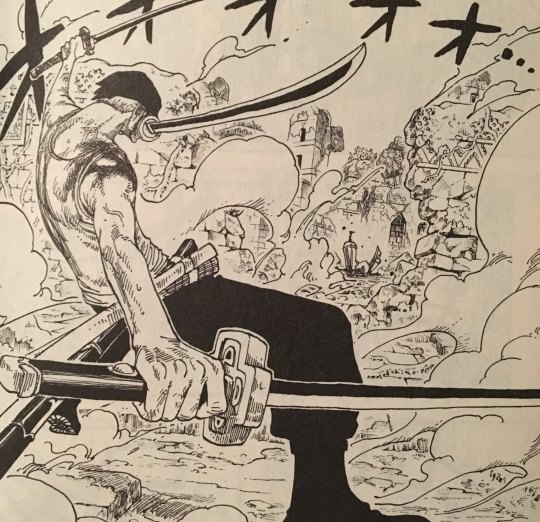
“jonny you sure are posting a lot of panels of zoro being cool without any real commentary” yeah. he kicks ass in this arc
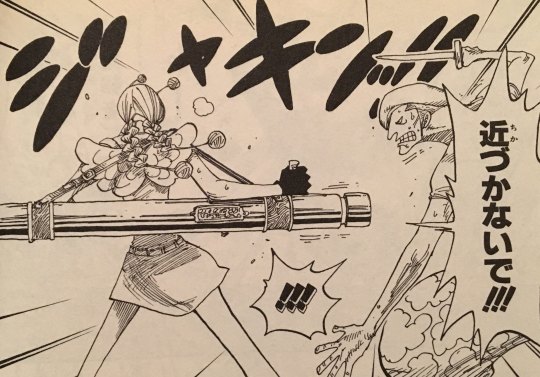
conis is a very underrated character, i think. she’s pretty easy to overlook, but she also manages to completely break the indoctrination she’s been raised into and gambles her own life to save most of the population of angel island from complete extermination. she yells that she doesn’t recognize enel as god, an instant death sentence at any other time, just to get them to listen to her.
there’s a moment, in this scene, where a boy throws a rock at her for insulting enel, and she just stands there, and lets the blood trickle down her face, and keeps making her case. honestly, i really like her.
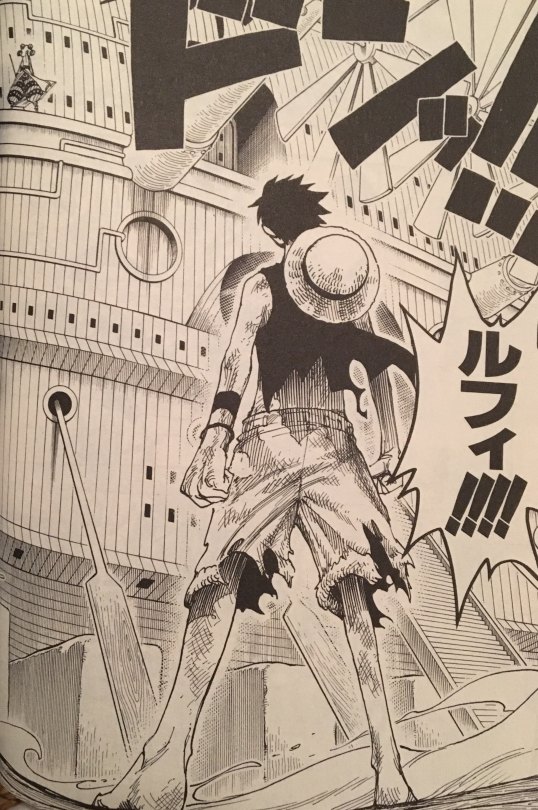
look at this page. look how it’s framed. luffy in the foreground, taking up most of the page- enel in the background, tiny, inconsequential.
now that’s how you draw god’s natural enemy.
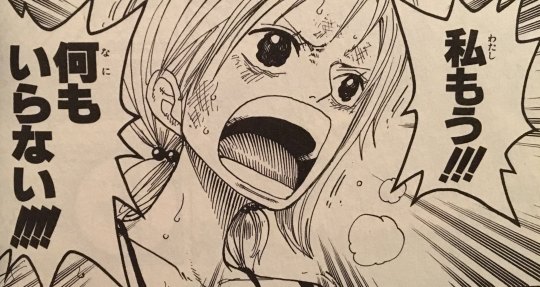
this is one of my favorite nami character moments in the whole manga. nami is a greedy person. she has a lot of things she wants. it’s one of her defining traits.
but when faced with someone with godlike power, offering her absolutely anything she wants if she’ll just abandon her friends and come with him- she doesn’t want anything, for that price, even with her life on the line if she declines. she knows exactly what her treasure is.
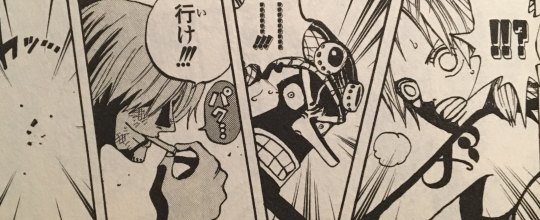
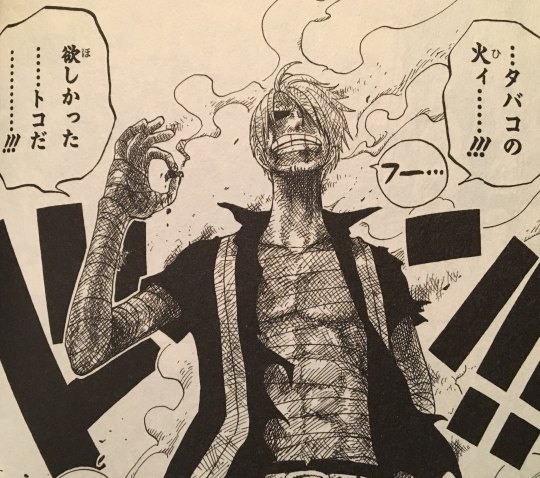
obviously this is an awesome panel, but sanji’s little smile just before enel strikes him is what really, really makes it for me. he’s about to get slammed with several thousand volts of lightning, but more importantly, nami and usopp are going to be safe.
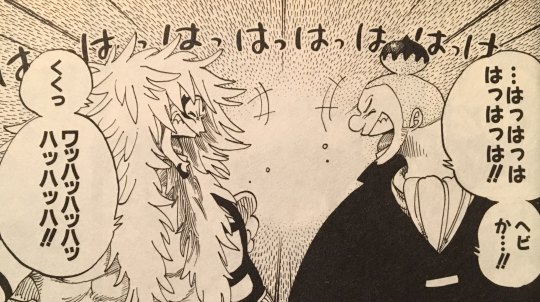
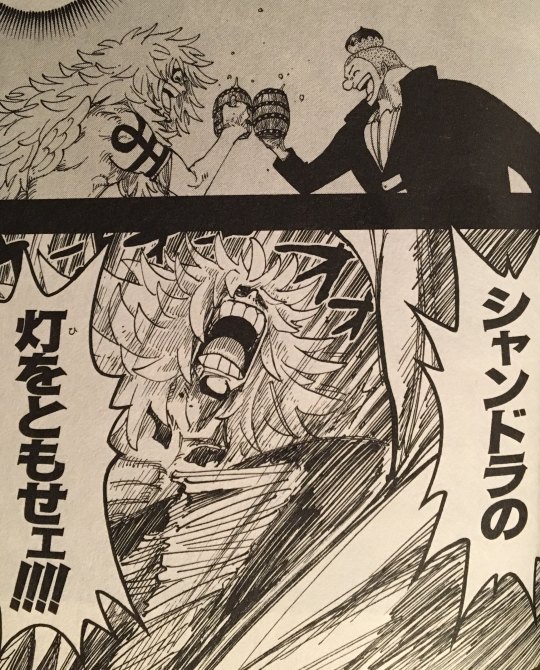
the skypiea flashback is one of my very favorites, and also the first time one piece ever made me cry. i nearly cried just flipping through it again for this post. it’s just so fucking devastating.
noland never stopped looking, and calgara never stopped waiting, and neither of them ever lost faith in each other despite how badly they fell out at the end, and wow, that just kills me. but at the same time, it makes the way the flashback and the main story come together at the end so satisfying and cathartic.
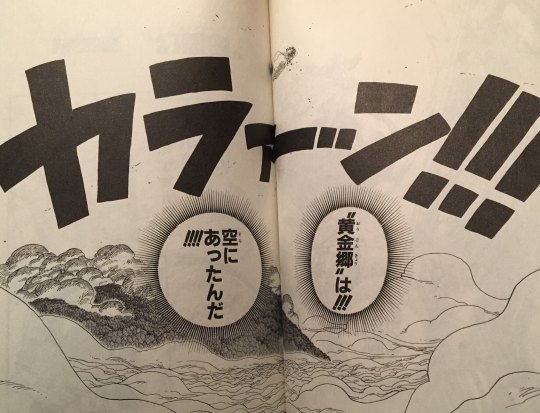
i do think skypiea has one of the best climaxes of any arc. the way all the disparate elements and plot threads- enel, the story of noland and calgara, the war between the skypieans and shandians, cricket’s search down on jaya- come together and tie up so perfectly that the entire arc can be ended by the ringing of a single massive bell is nothing less than genius writing.
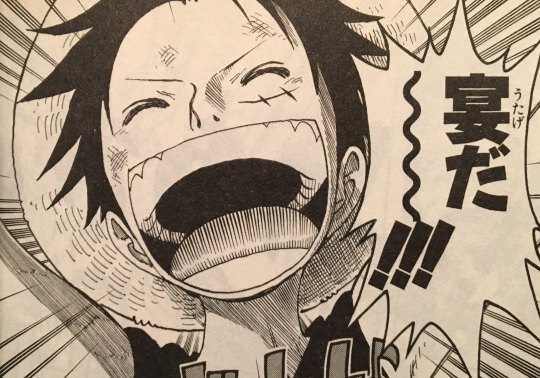
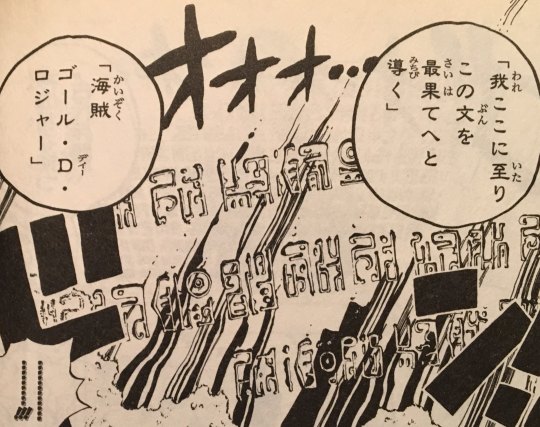
i really love the establishment of roger’s poneglyph message and all the things it implies here. it raises so many questions, most of which we’ve only now gotten answered, in wano. oda’s capacity for long-term storytelling is one of his greatest strengths, and this is probably one of my favorite examples of it. (see also, in jaya when sanji mentions offhand that he was born in north blue.)
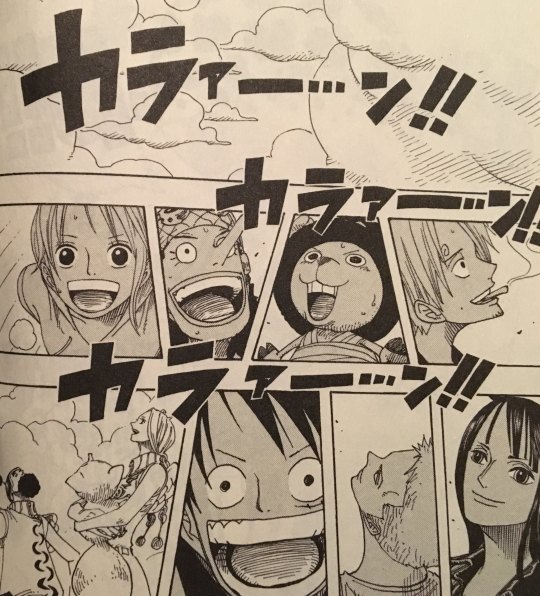
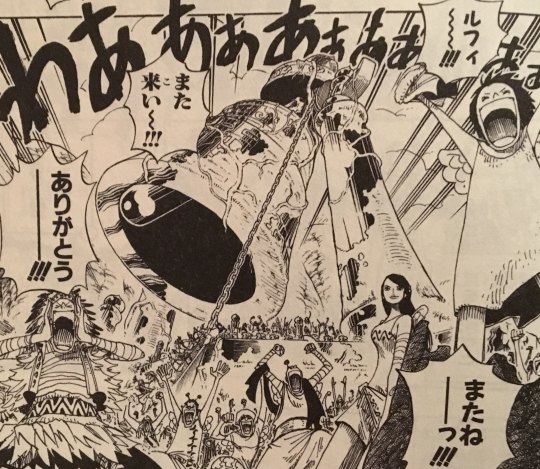
i just really love seeing them all smiling, and i love the parallels to calgara and noland’s sendoff here. feels like a wound finally healing, after four hundred years.
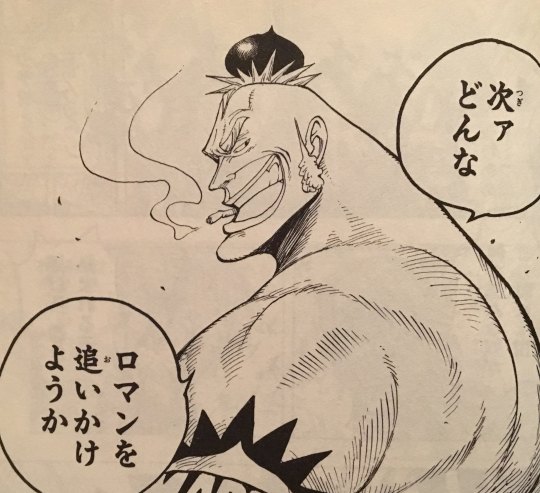
and, of course, it ends with cricket, asking what crazy, romantic dream they’re going to chase down next. because this is one piece!! just because you find the end of one rainbow doesn’t mean you stop looking for the next one.
243 notes
·
View notes